NOVEMBER
2010 DOWNLOAD ROUNDUP
Brian Wilson
DOWNLOAD OF THE MONTH
William BYRD (1539?1543?-1623)
Music for Holy Week and Easter
Plorans ploravit (5vv) [4:58]
Passion according to St John (plainsong) with Byrd’s music for
chorus (Turbarum voces in Passione Domini secundum Johannem)
[35:38]
Adoramus te, Christe (5vv and viols) [1:38]
Psalm 116: Antiphon and Alleluia [1:42]
Vespere autem sabbati - Magnificat [5:48]
Oratio - Ite missa est [1:34]
Resurrexi et adhuc tecum sum (5vv) [4 :57]
Hæc dies (motet for 5 vv) [1:51]
Victimæ paschali (motet for 5vv) [5:11]
Terra tremuit (5vv) [00:48]
Pascha nostrum (5vv) [1:39]
Hæc dies (6vv) [1:15]
Angelus Domini descendit (motet for 3vv) [1:15]
Mane vobiscum [00:47]
Post dies octo (motet for 3vv) [00:54]
Christus resurgens (motet for 4vv) [5:33]
The Cardinall’s Musick/Andrew Carwood - rec. c.2000. DDD.
ASV GAUDEAUMUS CDGAU214 [75:28] - from Passionato.com
(mp3 and lossless)
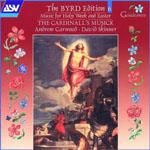 This
recording appears here for two reasons. Firstly, in its own
right, to represent the earlier volumes of the Byrd Edition
which were published on the ASV label, and secondly as a reminder
of the way in which the project has gone from strength to strength
since being taken up by Hyperion. That final volume was my Download
of the Month for February 2010 and it’s likely to figure as
one of my Recordings of the Year (CDA67779). If anything, the
Holy Week and Easter music on the earlier CD - Volume 6 of the
series - is even more impressive because it is themed around
the major festival of the Christian Year. With ASV recordings
increasingly difficult to obtain - Universal have actually deleted
several of the CDs - I’m very pleased to note that Passionato
have released several, including some of the Early Music Gaudeamus
series, as downloads. The ideal solution would be for Universal
and Hyperion to do a deal to allow the latter to offer the whole
series - perhaps in a box set.
This
recording appears here for two reasons. Firstly, in its own
right, to represent the earlier volumes of the Byrd Edition
which were published on the ASV label, and secondly as a reminder
of the way in which the project has gone from strength to strength
since being taken up by Hyperion. That final volume was my Download
of the Month for February 2010 and it’s likely to figure as
one of my Recordings of the Year (CDA67779). If anything, the
Holy Week and Easter music on the earlier CD - Volume 6 of the
series - is even more impressive because it is themed around
the major festival of the Christian Year. With ASV recordings
increasingly difficult to obtain - Universal have actually deleted
several of the CDs - I’m very pleased to note that Passionato
have released several, including some of the Early Music Gaudeamus
series, as downloads. The ideal solution would be for Universal
and Hyperion to do a deal to allow the latter to offer the whole
series - perhaps in a box set.
A 50% discount meant that the lossless version was actually
less expensive than the mp3 when I last checked. It probably
won’t be when you read this review, but it is well worthwhile
checking Passionato’s various, often generous, discounts from
time to time.
BARGAIN OF THE MONTH
Alexander GLAZUNOV (1865-1936)
Complete Symphonies
Symphony No.1 in E, Op.5 ('Slavonian') [32:35]
Symphony No.2 in f# minor, Op.16 (In memory of Liszt) [42:50]
Symphony No.3 in D, Op.33 [42:16]
Symphony No.4 in E-flat, Op.48 [34:23]
Symphony No.5 in B-flat, Op.55 [32:35]
Symphony No.6 in c minor, Op.53 [35:10]
Symphony No.7 in F, Op.77 ('Pastorale') [32:24]
Symphony No.8 in E-flat, Op.83 [40:32]
Moscow Radio Symphony Orchestra/Vladimir Fedoseyev - rec. Melodiya
1972-81. ADD.
(No catalogue number) [292:48] - from Amazon.co.uk
or iTunes (both mp3)
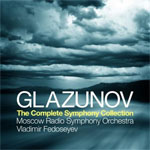 Both
Amazon and iTunes have this recording in various formats, the
least expensive of which contains just the symphonies at £4.49
(iTunes) or £4.99 (Amazon). Another version adds the Slavonic
Feast in G, Op.26a at £5.99 (Amazon) or £7.99
(iTunes). iTunes also have the Denon Essentials version of the
symphonies for £7.90. All these offer almost five hours
of wonderfully tuneful music - I’m not going to get into the
argument about how 'symphonic' these works are or how much or
little the music develops from one symphony to the next - idiomatically
performed and decently recorded, at very reasonable prices.
Both Amazon and iTunes will sync the music to the iTunes player,
from where it can be burned to CD - if you pair Nos.1 and 2,
3 and 4, 5 and 6, and 7 and 8, you'll just be able to burn to
four CDs. Alternatively, if you have a CD player which accepts
mp3 discs, you'll get them all on one disc, with room to spare.
It sounds like sacrilege to play an mp3 disc on my Cambridge
Audio Blu-ray and SACD player, but it sounds very well, with
just a hint of occasional congestion, for example in the andante
of No.5 (track 18).
Both
Amazon and iTunes have this recording in various formats, the
least expensive of which contains just the symphonies at £4.49
(iTunes) or £4.99 (Amazon). Another version adds the Slavonic
Feast in G, Op.26a at £5.99 (Amazon) or £7.99
(iTunes). iTunes also have the Denon Essentials version of the
symphonies for £7.90. All these offer almost five hours
of wonderfully tuneful music - I’m not going to get into the
argument about how 'symphonic' these works are or how much or
little the music develops from one symphony to the next - idiomatically
performed and decently recorded, at very reasonable prices.
Both Amazon and iTunes will sync the music to the iTunes player,
from where it can be burned to CD - if you pair Nos.1 and 2,
3 and 4, 5 and 6, and 7 and 8, you'll just be able to burn to
four CDs. Alternatively, if you have a CD player which accepts
mp3 discs, you'll get them all on one disc, with room to spare.
It sounds like sacrilege to play an mp3 disc on my Cambridge
Audio Blu-ray and SACD player, but it sounds very well, with
just a hint of occasional congestion, for example in the andante
of No.5 (track 18).
The Chandos rivals, performed by the Russian State SO under
Polyansky, cost a great deal more, especially as the symphonies
are mostly coupled with music which you may not want, though
you may prefer to pay extra for better recording quality and
access to the booklets of notes:
Symphony No.1; Violin Concerto - CHAN9751 - from theclassicalshop
(mp3 and lossless)
Symphony No.2; Coronation Cantata – CHAN9709 – from theclassicalshop
(mp3 and lossless)
Symphony No.3; Concert Waltzes – CHAN9658 – from theclassicalshop
(mp3 and lossless)
Symphonies Nos.
4 and 5 – CHAN9739 – from theclassicalshop
(mp3 and lossless)
Symphony No.6;
Characteristic Suite – CHAN10238 – from theclassicalshop
(mp3 and lossless)
Symphony No.8;
Commemorative Cantata; Poème lyrique – CHAN9961
– from theclassicalshop
(mp3 and lossless)
If you want the Polyansky as a complete set
(with Yondani Butt’s 7th Symphony, 'borrowed' from ASV - Polyansky
never recorded it), it’s less expensive to buy the Brilliant
Classics 7-CD box set, currently on offer for £14, which
MWI classical editor Rob Barnett made his Bargain of the Month
(93565 – see review).
If you still have any of the Melodiya/Gennadi Rozhdestvensky
recordings which used to be available on Olympia (complete set
OCD5001), keep them. I shall certainly hold on to my copy of
No.6, if only for the coupling, Scènes de Ballet, Op.52,
which I don’t think is currently available (OCD104).
Damian’s 78s
Freebies are even better bargains than cheapos which brings
me to Damians 78s.co.uk: you'll find all the available recordings
listed here.
I shan’t offer detailed reviews, because you can experiment
for yourself and ditch anything that you don’t like of these
well-transferred 78s and some early LPs. I tried the 1946 Cincinnati
SO/Eugene Goossens recording of Delius’s Walk to the Paradise
Garden (RCA Victor 11-9493) and the early-1950s Dvořák
New World from Jascha Horenstein and the Vienna Symphony Orchestra
(from Vox PL7590), both very enjoyable - the Dvořák
a trifle too leisurely, perhaps? The New World was known as
No.5 in the 1950s. The bit-rate is rather low (160 kb/s) but
the sound is more than tolerable.
REISSUE OF THE MONTH
Sacred Music in the Renaissance, Volume 1 - The Tallis Scholars
Finest Recordings: 1980-1989
Gregorio ALLEGRI (1582-1652)
Miserere [12:32]
William BYRD (1539/40-1623)
Mass for five voices [22:28]; Ave verum corpus [4:15]
Tomás Luis de VICTORIA (1548-1611)
Requiem** [35:21]; Versa est in luctum**[3:57]
Thomas TALLIS (c.1505-1585)
Spem in alium (40-part motet) [9:59]
Sancte Deus [5:17]
Salvator mundi, salva nos I [2:20]
Salvator mundi, salva nos II [2:35]
Gaude gloriosa [16:45]
Miserere nostri [2:30]
Loquebantur variis linguis [3:44]
If ye love me [2:04]
Hear the voice and prayer [3:02]
A new commandment [2:42]
O Lord, give thy holy spirit [2:17]
Purge me, O Lord [1:42]
Verily, verily I say unto you [1:41]
Remember not, O Lord God [4:44]
Tunes for Archbishop Parker’s Psalter [7:53]
O Lord, in thee is all my trust [2:55]
Christ rising again [4:35]
Blessed are those that be undefiled [3:45]
Josquin DES PREZ (c.1450/55-1521)
Missa La sol fa re mi [28:59]
Jacob CLEMENS non Papa (c.1510-c.1555)
Missa Pastores quidnam vidistis* [31:16]; Tribulationes
civitatum*[5:20]
Thomas CRECQUILLON (c.1505-c.1557)
Pater peccavi *[8:39]
Jacob CLEMENS NON PAPA Ego
flos campi* [4:16]
John SHEPPARD (c.1515-1558)
Media vita* [21:45]
William CORNYSH (d.1523) Salve
regina* [13:53]; Gaude virgo mater Christi* [5:27]
Plainchant Assumpta est Maria* [0:24]
Giovanni Pierluigi de PALESTRINA
(1525/6-1594) Assumpta est Maria* [7:13]; Missa
Assumpta est Maria* [29:50]
The Tallis Scholars/Peter Phillips
rec. 1980-1989, Merton College Chapel, Oxford; *the Church of
St Peter, Salle, Norfolk; **St John’s Church, Hackney, London.
DDD - except Allegri (ADD)
Latin texts and English, French, German translations included
GIMELL GIMBX301 [4 CDs: 78:34 + 79:37 + 78:33 + 78:35]
- from Gimell
(mp3 or lossless)
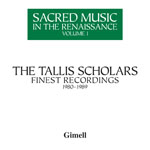 This
new 4-CD set outshines even the excellent 2-for-1 offers which
Gimell already had in their catalogue, all of which - indeed,
all the earlier recordings from which the contents of the new
set are drawn - are reviewed in my article The Tallis Scholars
at Thirty - here.
For all the virtues of rival recordings, notably by The Sixteen,
Chapelle du Roi and The Cardinall’s Musick on the Hyperion and
Signum labels, there is not a single item listed above for which
I would not rate The Tallis Scholars’ recording at or very near
the top of my recommendations. Reviewing the new reissue has
prompted me to turn to the originals of everything here, to
enjoy the Scholars’ performances all over again - and this is
just the first of three volumes, one for each decade of the
Scholars’ 30-year existence.
This
new 4-CD set outshines even the excellent 2-for-1 offers which
Gimell already had in their catalogue, all of which - indeed,
all the earlier recordings from which the contents of the new
set are drawn - are reviewed in my article The Tallis Scholars
at Thirty - here.
For all the virtues of rival recordings, notably by The Sixteen,
Chapelle du Roi and The Cardinall’s Musick on the Hyperion and
Signum labels, there is not a single item listed above for which
I would not rate The Tallis Scholars’ recording at or very near
the top of my recommendations. Reviewing the new reissue has
prompted me to turn to the originals of everything here, to
enjoy the Scholars’ performances all over again - and this is
just the first of three volumes, one for each decade of the
Scholars’ 30-year existence.
The obvious complement is Hyperion’s box set of The Sixteen,
The Golden Age of English Polyphony (CDS44401/10 - Bargain of
the Month: see review
and review).
That is both a larger collection in that it runs to 10 CDs and
more limited in that it covers only English music of the period:
those who bought the Hyperion would not duplicate any of the
repertoire in purchasing the Gimell set. There’s a great deal
of Taverner on the Hyperion set, for example, (CDs 2-6) and
none on the Gimell. There’s no Tallis on the Hyperion but, as
befits their name, a good deal from the Tallis Scholars, both
Latin and English settings. The one Sheppard work which appears
on Gimell, Media vita, does not figure on the three Hyperion
discs devoted to his music.
Both sets are very inexpensive: the Gimell costs £14.75
for mp3, £15.75 for lossless and £19.75, direct
from Gimell, but some dealers are advertising the set on CD
for as little as £14 plus p&p. The Hyperion works
out about the same per disc: £40 for the mp3 or lossless
download and £50 for the CDs - again, some online dealers
undercut the price of both the CDs and download by offering
the set for around £40.
Let me also urge you also to investigate the free recordings
from Merton College Chapel, Oxford, available for streaming
here.
The choir is directed by Peter Phillips and recorded by Steve
Smith, better known as the prime movers of The Tallis Scholars
and the Gimell label.
DISCOVERY OF THE MONTH
John ELLIS (1943-2010)
Music for Organ: Volume 1: Allegro and Passacaglia (1995);
Variations on Veni, Creator Spiritus (Mechlin) (1999);
Three Hymn Tune Voluntaries (1995); Suite in A (Divertissement)
(1998); Concert Waltz (1999); Three Short Voluntaries (1994);
Meditation on 'Rockingham' (1996); Coventry Carol Meditation
(1998); Finale-fantasia on Orientis Partibus (1996)
Ronald Frost (organ) - rec. St Anne’s Church, Manchester. No
date given
DIVINE ART DIVERSIONS DDV24141 [62:19] - from theclassicalshop.net
(mp3 and lossless)
Music for Organ: Volume 2: Variations on Picardy
(2005); Scherzo-Fantasie (2002; Festive Voluntary (2006); Two
Hymn-Tune Preludes (2000); Toccata (2002); Minuet (2002); Three
Pieces for Organ (2003); Organ Symphony (2009)
Robin Walker (organ) - rec. Bolton Parish Church. No date given
DIVINE ART DDA25087 [67:04] - from theclassicalshop.net
(mp3 and lossless)
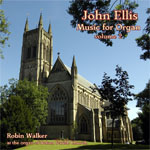 The
very detailed review by David Hackbridge Johnson - here
- says it all. It remains only for me to add how much I enjoyed
John Ellis’s music, the performances, the recording and the
(lossless) transfer. If I single out the marvellous variations
on Veni Creator Spiritus from DDV24141 - a wonderful
set of variations on a marvellous tune - that’s not intended
to downplay the rest of the two CDs.
The
very detailed review by David Hackbridge Johnson - here
- says it all. It remains only for me to add how much I enjoyed
John Ellis’s music, the performances, the recording and the
(lossless) transfer. If I single out the marvellous variations
on Veni Creator Spiritus from DDV24141 - a wonderful
set of variations on a marvellous tune - that’s not intended
to downplay the rest of the two CDs.
Volume 1 is a welcome reissue of a Dunelm original, Volume 2
is a new recording. When Stephen Sutton set up the Divine Art
label in 1993, his first aim was to record all the great church
organs of NE England - 'got nowhere at all' is his cryptic comment
on that - and his second was to include as many premieres as
possible. He may have strayed West of the Pennines for these
recordings, but I’d say that they remain pretty true to his
original aims. Perhaps he’d now consider recording the fine
organ in the cathedral of my old home town, Blackburn.
***
Empezar quiero contar: Canciones de Sefarad
Ovadiah ha-Ger ('the Proselyte')
(early 12th century) Mi al har Khorev (Who stood
on Mount Horeb?) [1:49]
Dunash ibn Labrat
(10th.Century) / Trad. Yemeni Jewish melody Dror
Yiqra [7:51]
Wife of Dunash ibn Labrat
(attr.) (10th Century) Hayizkor hakhen yedida
(Will he remember the graceful doe?) / music by Beatriz
de Día (12th Century)* A chantar m'er [3:13]
Anon. (music from Bulgaria) Judeo-Spanish wedding song De
hoy en esta día (instrumental) [2:39]
Anon. (Morocco / Eastern Mediterranean) Judeo-Spanish love song:
Ay, madre [3:20]
Anon. (Morocco) Judeo-Spanish romance: La envenenadora
[5:23]
Anon. (Morocco) Judeo-Spanish romance: De Burgos partió
el rey (instrumental) [2:45]
Mathieu le Juif (12th century)
(France) Pour autrui movrai mon chant [4:05]
(Two poems by Vidal de Elvas
Moir'e faço dereito / E mal día non ensando
ei
( music by Guiraut de Riquer*
Pus astres no m'es donatz ;
( music by Alfonso X 'El Sábio'*
Cantiga 49: Ben com' aos que van per mar [3:06]
Trad. (Tras-os-Montes, Portugal) O pandeiro [2:11]
Trad. (Beira Baixa, Portugal) A padeirinha [1:36]
Anon., (Morocco) Judeo-Spanish hiloula song: ¿Adonde
váis, Señor Yitzkhak?** [2:09]
Anon. (Morocco) Judeo-Spanish coplas: La fragua de
la casa santa/Los Tres patriarcas de Israel [2:28]
Anon. (Eastern Mediterranean) Judeo-Spanish coplas, Allá
en el midbar (instrumental) [3:40]
Anon. (Morocco) Judeo-Spanish Purim song: Coplas de Purím:
Empezar quiero contar [2:04]
Anon., (Greece - Salonica) Judeo-Spanish Purim song: Coplas
de Purím; Alabar quero al Dio [3:12]
Anon., (Morocco, Sephardi) Song for Passover (Hebrew): Ashira
keshirat Moshe [2:09]
Anon., (Morocco) Judeo-Spanish wedding song: Ansí
se me arrimó [2:05]
Anon., (Morocco) Judeo-Spanish song (seguidillas): A la puerta
del río [2:44]
* Contrafacta by / ** arr. Judith R. COHEN
Judith R. Cohen (vocals, vielle, frame drums); Tamar Ilana Cohen
Adams (vocals, frame drum, shells); Wafir Sheik (oud, viola);
David Mayoral (percussion); Eduardo Paniagua (qanun, flutes,
tambourine, triangle, sistro) - rec. 2000. DDD
PNEUMA CDPN-270 [59:30] - from eMusic
(mp3)
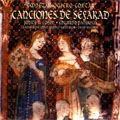 I
was in two minds about including this download. You really need
the words and translations of this Sephardic music, some of
it in Judeo-Spanish and some in Hebrew. Even if your Spanish
is good and your hearing acute, you are unlikely to catch and
understand everything - it’s like a fluent German speaker trying
to fathom Yiddish. Equally importantly, you need the detailed
and informative notes which accompany the CD, with which Dr
Judith R Cohen, the principal performer, has kindly supplied
me. It transpired that Dr Cohen was unaware that the recording
was on offer as a download and objects strongly to its continuing
to be so. On the other hand, I derived great enjoyment from
the combination of sound scholarship and communicative musicianship
on display here, so I strongly recommend purchase of the parent
CD - Amazon.com - here - or Amazon.co.uk
can oblige - here
-supplies at both were short when I checked. Only the slightly
over-elaborate percussion struck me as out of character in places:
I’m not surprised to learn that much of this was dubbed on later.
If you decide to download, at least read the notes at medieval.org
- here. Both eMusic and
Amazon, who also have the download, manage to transpose tracks
4 and 14.
I
was in two minds about including this download. You really need
the words and translations of this Sephardic music, some of
it in Judeo-Spanish and some in Hebrew. Even if your Spanish
is good and your hearing acute, you are unlikely to catch and
understand everything - it’s like a fluent German speaker trying
to fathom Yiddish. Equally importantly, you need the detailed
and informative notes which accompany the CD, with which Dr
Judith R Cohen, the principal performer, has kindly supplied
me. It transpired that Dr Cohen was unaware that the recording
was on offer as a download and objects strongly to its continuing
to be so. On the other hand, I derived great enjoyment from
the combination of sound scholarship and communicative musicianship
on display here, so I strongly recommend purchase of the parent
CD - Amazon.com - here - or Amazon.co.uk
can oblige - here
-supplies at both were short when I checked. Only the slightly
over-elaborate percussion struck me as out of character in places:
I’m not surprised to learn that much of this was dubbed on later.
If you decide to download, at least read the notes at medieval.org
- here. Both eMusic and
Amazon, who also have the download, manage to transpose tracks
4 and 14.
Johannes CICONIA (c.1370-1412)
O rosa bella; John BEDYNGHAM
(?1422-1459/60) O rosa bella* [4:45]
Alfred Deller (counter-tenor); August Wenzinger, Mariane Majer,
Gertrud Flügel (viols)
Guillaume DUFAY (c.1400-1474)
Ave Regina cœlorum** [3:53]
Burgundian Chansons: Filles a marier; Pour l'amour de ma
doullce amye*** [3:49]
Jacob OBRECHT (1457/8-1508)
Si oblitus fuero^ [5:32]; El grillo; Je ne puis
tener d'aimer^^ [4:33]
Josquin DESPREZ (c.1450-1521)
Tribulatio et angustia^^^ [2:53]
Schola Polyphonica/Henry Washington** ^ and ^^
Ensemble Pro Musica Antiqua de Bruxelles/Safford Capes***
Bodley Singers/Bernard Rose^^^ - all rec. 1949 and 1950. Mono.
ADD
BEULAH EXTRA 1BX95*, 2BX95**, 3BX95***,
4BX95^, 5BX95^^, 6BX95^^ [25:25] - from
Beulah (mp3)
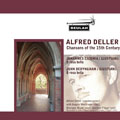 These
recordings, made originally for the Oxford History of Music,
were well worth reviving. They serve to remind us both of the
great strides which have been made since 1950 in the performance
of late medieval music and - more surprisingly - of the extent
to which some performers were capable of getting things right
even then. Some of the works here have not been too regularly
visited by the record companies even now: MDT list only one
obscure recording containing both the Ciconia and Bedyngham
settings of O rosa bella (Speculum
These
recordings, made originally for the Oxford History of Music,
were well worth reviving. They serve to remind us both of the
great strides which have been made since 1950 in the performance
of late medieval music and - more surprisingly - of the extent
to which some performers were capable of getting things right
even then. Some of the works here have not been too regularly
visited by the record companies even now: MDT list only one
obscure recording containing both the Ciconia and Bedyngham
settings of O rosa bella (Speculum 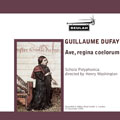 Ensemble,
Open Music CMBK0818). Hyperion offers the Bedyngham setting
(Catherine Bott, Delectatio angeli, CDA67549). For all
the music of Josquin that has been recorded, I can’t find a
single current version of his Tribulatio et angustia.
Ensemble,
Open Music CMBK0818). Hyperion offers the Bedyngham setting
(Catherine Bott, Delectatio angeli, CDA67549). For all
the music of Josquin that has been recorded, I can’t find a
single current version of his Tribulatio et angustia.
What more beautiful words could there be than those by Leonardo
Giustiniani which both Ciconia and Bedyngham set: O rosa
bella,/ O dolce anima mia/ Non mi lassar morire/ In cortesia,
in cortesia. 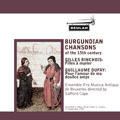 [O
beautiful rose, O my sweet soul, let me not die from courtly
love.] The second setting was formerly attributed to John Dunstaple,
but is now known as one of eight surviving songs by Bedyngham.
We may not perform it quite this way now, but Alfred Deller’s
beautiful voice is always guaranteed to be worth hearing. The
same applies to the other tracks. The recordings wear their
60 years fairly lightly in these transfers. Dip into individual
tracks by all means but, better still, go for the whole set.
Just don’t try to make close comparisons with the likes of Gothic
Voices or the Tallis Scholars in this repertoire.
[O
beautiful rose, O my sweet soul, let me not die from courtly
love.] The second setting was formerly attributed to John Dunstaple,
but is now known as one of eight surviving songs by Bedyngham.
We may not perform it quite this way now, but Alfred Deller’s
beautiful voice is always guaranteed to be worth hearing. The
same applies to the other tracks. The recordings wear their
60 years fairly lightly in these transfers. Dip into individual
tracks by all means but, better still, go for the whole set.
Just don’t try to make close comparisons with the likes of Gothic
Voices or the Tallis Scholars in this repertoire.
Charles AVISON (1709/10-1770)
12 Concerti Grossi after Geminiani’s sonatas for violin and
basso continuo, Op.1
Concerto grosso No. 1 in G [8:26]
Concerto grosso No. 2 in d minor [06:37]
Concerto grosso No. 3 in e minor [06:02]
Concerto grosso No. 4 in D [06:29]
Concerto grosso No. 5 in B flat [06:49]
Concerto grosso No. 6 in g minor [19:18]
Concerto grosso No. 7 in c minor [06:10]
Concerto grosso No. 8 in b minor [07:25]
Concerto grosso No. 9 in F [08:46]
Concerto grosso No. 10 in D [06:39]
Concerto grosso No. 11 in a minor [07:50]
Concerto grosso No. 12 in d minor [07:35]
The Avison Ensemble/Pavlo Beznosiuk
rec. 2-5 October 2005, Jubilee Theatre, St Nicholas’ Hospital,
Newcastle-upon-Tyne. DDD.
DIVINE ART DDA21210 [54:22 + 45:06] - from theclassicalshop.net
(mp3 and lossless)
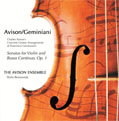 Johan
van Veen liked the music and the performances, but found the
sound too sharp for comfort, advising listeners not to take
in the whole set in one sitting - see review.
That remains sound advice, though Avison was no more guilty
of composing the same concerto 500 times than Vivaldi. This
release set the tone - a very high tone - for the whole series
which followed. I've followed with great interest, having first
encountered Avison on a 1960s Decca/Oiseau Lyre LP which was
also my introduction to the Academy of St Martin in the Fields
and Neville Marriner. They later recorded the Concertos after
Scarlatti but their version has been superseded by Goodman (Hyperion)
and the Divine Art release (see below).
Johan
van Veen liked the music and the performances, but found the
sound too sharp for comfort, advising listeners not to take
in the whole set in one sitting - see review.
That remains sound advice, though Avison was no more guilty
of composing the same concerto 500 times than Vivaldi. This
release set the tone - a very high tone - for the whole series
which followed. I've followed with great interest, having first
encountered Avison on a 1960s Decca/Oiseau Lyre LP which was
also my introduction to the Academy of St Martin in the Fields
and Neville Marriner. They later recorded the Concertos after
Scarlatti but their version has been superseded by Goodman (Hyperion)
and the Divine Art release (see below).
The download is available from other sources, but only theclassicalshop
includes the valuable booklet of notes as part of the deal.
You won’t save much by downloading over the price of the CDs,
even in mp3 format. The lossless download (I chose wma of the
many options) is excellent. I understand JV’s reservations about
the sound, but I don’t share them.
18 Concerti Grossi, Op.9 (1766-7) and Op.10 (1769)
Op. 9 No. 1 in G [7:41]
Op. 9 No. 2 in D [6:03]
Op. 9 No. 3 in A [6:52]
Op. 9 No. 4 in g minor [7:34]
Op. 9 No. 5 in C [8:06]
Op. 9 No. 6 in e minor [6:39]
Op. 9 No. 7 in E flat [6:10]
Op. 9 No. 8 in B flat [8:05]
Op. 9 No. 9 in c minor [6:36]
Op. 9 No. 10 in F [5:49]
Op. 9 No. 11 in A [6:26]
Op. 9 No. 12 in D [8:20]
Op. 10 No. 1 in d minor [7:17]
Op. 10 No. 2 in F [6:53]
Op. 10 No. 3 in c minor [6:43]
Op. 10 No. 4 in C [8:40]
Op. 10 No. 5 in E flat [6:25]
Op. 10 No. 6 in d minor [7:07]
The Avison Ensemble/Pavlo Beznosiuk
rec. The Jubilee Theatre, St Nicholas’s Hospital, Newcastle
upon Tyne, UK, 8-11 October 2006. DDD.
DIVINE ART DDA21211 [66:56 + 64:45] - from theclassicalshop.net
(mp 3 and lossless)
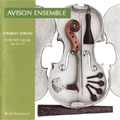 My
only reservations of any import on reviewing the CD set - here-
were the near-inaudibility of the harpsichord continuo - what’s
the use of it if you can’t hear it? - and the fact that I was
waiting for the Concerti Grossi after Scarlatti to appear.
I also echoed JV’s advice not to play the whole set in one go.
My
only reservations of any import on reviewing the CD set - here-
were the near-inaudibility of the harpsichord continuo - what’s
the use of it if you can’t hear it? - and the fact that I was
waiting for the Concerti Grossi after Scarlatti to appear.
I also echoed JV’s advice not to play the whole set in one go.
This time theclassicalshop don’t provide the booklet and my
remarks (above) about the price of the download from any source
not representing much saving over the CDs also applies. Classicsonline
sells the mp3 version for rather less than theclassicalshop,
but only the latter currently offers lossless sound.
12 Concerti Grossi (1744) after Domenico SCARLATTI (1685-1757)
The Avison Ensemble/Pavlo Beznosiuk
rec. Jubilee Theatre, St Nicholas’ Hospital, Newcastle upon
Tyne, England, 26-30 November 2007. DDD.
DIVINE ART DDA21213 [78:14 + 76:38] - from theclassicalshop.net
(mp3 and lossless)
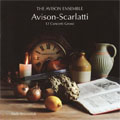 I
was, if anything, even more impressed with this than with the
earlier releases. Reviewing the original CDs - here
- I leaned slightly at times towards the modern-instrument
Academy of St Martin’s recording, formerly available on a Philips
Duo but now apparently deleted. On the whole, however, this
new recording outshines its predecessor. I had not then heard
the Hyperion Dyad set (CDD22060, Brandenburg Consort/Goodman).
I have now heard the Hyperion and marginally prefer the Divine
Art, though the Hyperion download beats all comers for price
at £7.99 for the complete set, mp3 or lossless, with a
pdf version of the notes.
I
was, if anything, even more impressed with this than with the
earlier releases. Reviewing the original CDs - here
- I leaned slightly at times towards the modern-instrument
Academy of St Martin’s recording, formerly available on a Philips
Duo but now apparently deleted. On the whole, however, this
new recording outshines its predecessor. I had not then heard
the Hyperion Dyad set (CDD22060, Brandenburg Consort/Goodman).
I have now heard the Hyperion and marginally prefer the Divine
Art, though the Hyperion download beats all comers for price
at £7.99 for the complete set, mp3 or lossless, with a
pdf version of the notes.
Joseph HAYDN (1732-1809) Paris
Symphonies
No.82 in C (L'ours) [27:36]; No.83 in g minor (La
poule) [25:28] ; No.84 in E-flat [24:28]; No.85 in B-flat
(La reine) [27:35]; No.86 in D [25:48]; No.87 in A [24:33]
Orchestra of the Age of Enlightenment/Sigiswald Kuijken - rec.
1989. DDD.
VIRGIN VERITAS 5616592 [2 CDs: 155:25] - from Passionato.com
(mp3 and lossless)
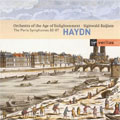 Nikolaus
Harnoncourt’s award-winning performances of these six symphonies
are not to all tastes - with all repeats taken, they run to
three CDs - and they are available as downloads only from HMV
digital - here
- so far as I am aware. Kuijken’s performances offer the
ideal blend of period style and sheer enjoyment of music-making:
to take just one example, it’s easy form this performance to
imagine a cartoon version of the clucking hen that gave its
name to the opening movement of No.83. (Whether Haydn sanctioned
the nickname or not, it’s appropriate.) The symphonies are well
recorded and the lossless transfer is excellent. At the time
of writing the set is available at half price, which makes the
download competitive with the physical CDs, retailing for around
£8.50. At Passionato’s normal price, however, you are
better off buying the discs or going to Amazon.co.uk, where
a 256kb/s download costs £5.99. Alternatively, go for
the symphonies individually in good modern-instrument performances
on Naxos, where each is coupled with two symphonies from other
periods - that way you will obtain a wider perspective on Haydn.
I recommended Nos.83, 94 and 101 (8.550114) and Nos.85, 92 and
103 (8.550387) in my June 2009 Roundup.
Nikolaus
Harnoncourt’s award-winning performances of these six symphonies
are not to all tastes - with all repeats taken, they run to
three CDs - and they are available as downloads only from HMV
digital - here
- so far as I am aware. Kuijken’s performances offer the
ideal blend of period style and sheer enjoyment of music-making:
to take just one example, it’s easy form this performance to
imagine a cartoon version of the clucking hen that gave its
name to the opening movement of No.83. (Whether Haydn sanctioned
the nickname or not, it’s appropriate.) The symphonies are well
recorded and the lossless transfer is excellent. At the time
of writing the set is available at half price, which makes the
download competitive with the physical CDs, retailing for around
£8.50. At Passionato’s normal price, however, you are
better off buying the discs or going to Amazon.co.uk, where
a 256kb/s download costs £5.99. Alternatively, go for
the symphonies individually in good modern-instrument performances
on Naxos, where each is coupled with two symphonies from other
periods - that way you will obtain a wider perspective on Haydn.
I recommended Nos.83, 94 and 101 (8.550114) and Nos.85, 92 and
103 (8.550387) in my June 2009 Roundup.
Wolfgang Amadeus MOZART (1756-1791)
Serenade No.13 in G, K525 (Eine kleine Nachtmusik)
Sinfonia of London/Muir Mathieson - rec. 1958. Stereo. ADD.
BEULAH EXTRA 2BX93 [14:36] - from Beulah
(mp3)
Così fan tutte: Overture, K588
Sinfonia of London/Muir Mathieson - rec. 1958. Stereo. ADD.
BEULAH EXTRA 3BX93 [5:02] - from Beulah
(mp3)
Franz SCHUBERT (1797-1828)
Symphony No.5 in B-flat, D485
Sinfonia of London/Muir Mathieson - rec. 1958. Stereo. ADD.
BEULAH EXTRA 1BX93 [21:56] - from Beulah
(mp3)
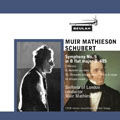 The
Sinfonia of London didn’t actually exist: the title conceals
an ad hoc group of top musicians from the London orchestras
who came together, in different permutations, to record for
EMI and their subsidiary, World Record Club. Their recording
of Eine Kleine
The
Sinfonia of London didn’t actually exist: the title conceals
an ad hoc group of top musicians from the London orchestras
who came together, in different permutations, to record for
EMI and their subsidiary, World Record Club. Their recording
of Eine Kleine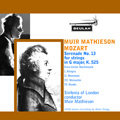 Nachtmusik with Muir Mathieson is light and sprightly without
ever sounding superficial and the 1958 stereo is still easy
on the ear. The same comments apply to the Così
Overture and to the stylish Schubert Symphony No.5
- but don’t forget the superb Beecham recording of Schubert’s
Third, Fifth and Sixth Symphonies (EMI Great Recordings - see
May 2009 Roundup).
Nachtmusik with Muir Mathieson is light and sprightly without
ever sounding superficial and the 1958 stereo is still easy
on the ear. The same comments apply to the Così
Overture and to the stylish Schubert Symphony No.5
- but don’t forget the superb Beecham recording of Schubert’s
Third, Fifth and Sixth Symphonies (EMI Great Recordings - see
May 2009 Roundup).
As I still have not completed the survey of Beulah Extra back
catalogue which I promised some time ago, I include here some
of their other Mozart recordings, details of all of which may
be found here.
Symphony No.40, K550 [22:54]; Bassoon Concerto, K191* [18:50];
Symphony No.41, 'Jupiter', K551 [28:24]
Henri Helaerts (bassoon)*; London Symphony Orchestra*; Sinfonia
of London/Anthony Collins - rec. c.1954* c.1958. Mono*/stereo
ADD.
BEULAH 2PD26 [69:41] - from Beulah
here or iTunes
or Amazon.
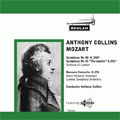 The
main difference between Anthony Collins’ way with the symphonies
and the majority of more recent recordings concerns the omission
of repeats which, typically, extend playing times by around
half - Trevor Pinnock’s recording of No.40, for example, (Complete
Symphonies, DG Archiv 471 6662) takes 32:51 and Sir Charles
Mackerras 34:06 (Symphonies 38-41, Linn CKD308). I wouldn’t
wish to be without one or both of those period-instrument performances,
but Collins’ Mozart is stylish, too, in its own way. His version
of No.40 is far preferable to André Vandernoot’s HMV
Concert Classics recording of much the same vintage from which
I got to know Nos.39 and 40, and his No.41 is not far behind
Bruno Walter’s stereo CBS version, coupled with No.35, also
of about the same vintage, last seen on M2YK45676, a 2-CD set
of the last six symphonies which is in urgent need of reissue.
Collins is slightly fleeter of foot than Walter or Beecham (in
No.41, see below), which suits No.40 very well, though I marginally
prefer Walter’s or Beecham’s rather weightier Jupiter, especially
in the slow movement, where Collins is a little too matter-of-fact
for the marking andante cantabile.
The
main difference between Anthony Collins’ way with the symphonies
and the majority of more recent recordings concerns the omission
of repeats which, typically, extend playing times by around
half - Trevor Pinnock’s recording of No.40, for example, (Complete
Symphonies, DG Archiv 471 6662) takes 32:51 and Sir Charles
Mackerras 34:06 (Symphonies 38-41, Linn CKD308). I wouldn’t
wish to be without one or both of those period-instrument performances,
but Collins’ Mozart is stylish, too, in its own way. His version
of No.40 is far preferable to André Vandernoot’s HMV
Concert Classics recording of much the same vintage from which
I got to know Nos.39 and 40, and his No.41 is not far behind
Bruno Walter’s stereo CBS version, coupled with No.35, also
of about the same vintage, last seen on M2YK45676, a 2-CD set
of the last six symphonies which is in urgent need of reissue.
Collins is slightly fleeter of foot than Walter or Beecham (in
No.41, see below), which suits No.40 very well, though I marginally
prefer Walter’s or Beecham’s rather weightier Jupiter, especially
in the slow movement, where Collins is a little too matter-of-fact
for the marking andante cantabile.
The Bassoon Concerto was originally coupled with the
Clarinet Concerto, now on 1BX45-3BX45 (below). It was
wise to offer the Clarinet Concerto on its own, since
it contains the better performance: go for the Brooke/Beecham
recording of the Bassoon Concerto, below, but the performance
here makes a worthwhile add-on to the symphonies.
The (Decca) mono recording of the Bassoon Concerto is
more than acceptable. The symphony recordings were made in the
late 1950s, for World Record Club, and the stereo sound has
come up as fresh as paint in the new transfer.
Clarinet Concerto in A, K622
Gervase de Peyer; London Symphony Orchestra/Anthony Collins
- rec. 1954. Mono/ADD.
BEULAH EXTRA 1BX45-3BX45 [27:13] - from Beulah (mp3)
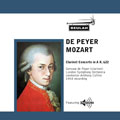 The
recording of the Clarinet Concerto was hailed as the
best available in 1955 and it remains well worth hearing, though
inevitably eclipsed as sound by de Peyer’s later recording with
Peter Maag and by his great rival, Jack Brymer. It was through
the Brymer/Beecham recording that I got to know this wonderful
work and I still turn to that version with pleasure, but I became
even more thoroughly acquainted with the de Peyer/Maag when
a colleague decided to brush up his clarinet playing by tackling
this Mozart concerto, modelling his interpretation on de Peyer’s.
Whenever a competent pianist was not to hand, it fell to my
lot to try to accompany him, with very variable success on both
parts.
The
recording of the Clarinet Concerto was hailed as the
best available in 1955 and it remains well worth hearing, though
inevitably eclipsed as sound by de Peyer’s later recording with
Peter Maag and by his great rival, Jack Brymer. It was through
the Brymer/Beecham recording that I got to know this wonderful
work and I still turn to that version with pleasure, but I became
even more thoroughly acquainted with the de Peyer/Maag when
a colleague decided to brush up his clarinet playing by tackling
this Mozart concerto, modelling his interpretation on de Peyer’s.
Whenever a competent pianist was not to hand, it fell to my
lot to try to accompany him, with very variable success on both
parts.
It’s some time since I heard that de Peyer/Maag recording, so
I can’t make a direct comparison, but de Peyer’s contribution
is always first rate. Heard in its own right, the earlier performance
with Anthony Collins in charge of the accompaniment sounds very
fine, and the recording, as tidied up by Beulah, is more than
adequate. In fact, I think it has a slight edge on their Anthony
Collins Sibelius CDs which I reviewed in my May 2010 Download
Roundup.
Passionato have the RPO/Sir Thomas Beecham recording of the
Jupiter Symphony with the Jack Brymer Clarinet Concerto
and the Gwydion Brooke Bassoon Concerto (5676012) - an
essential purchase, especially for the Bassoon Concerto,
but not at the expense of these two equally classic Collins
Mozart recordings.
Piano Concerto No.12 in A, K414 [24:45]
Louis Kentner (piano); London Philharmonic Orchestra/Thomas
Beecham - rec. 1940. Mono/ADD
BEULAH EXTRA 1BX49-2BX49-3BX49 [24:45] - from Beulah (mp3)
Inevitably the sound of this 1940s recording is much thinner
than that from the 1950s master tapes which Beulah have employed
for the other Mozart recordings. Beecham’s Mozart was always
stylish and this performance is no exception - nor did I detect
any of the naughty little tricks in which he sometimes indulged.
Beulah print the original review from The Gramophone,
in which Kentner’s playing is praised, though the reviewer also
thought it nothing special. I see what he meant - everything
is in place, but it sounds just a little dutiful rather than
fully engaged. It’s well worth hearing, but a recording of this
vintage has to be special to warrant repeated listening and
I don’t think that this quite makes it, when there are several
modern recordings where the pianist is more in tune with Mozart.
Many of these are embedded in complete boxed sets, but Jenö
Jandó’s version on Naxos 8.550202, with Nos. 14 and 21,
is not and it can be downloaded from classicsonline, eMusic
or passionato. The original 78s cost 18 shillings in 1940, at
least £40 in modern terms. Clearly some things have changed
for the better when you can have this recording from Beulah
for £1.50.
Piano Concerto No.14 in E-flat, K449 [22:29]
Colin Horsley (piano); Philharmonia Orchestra/Basil Cameron
- rec. 1954. Mono/ADD.
BEULAH EXTRA 1BX85-2BX85-3BX85 [22:29] - from Beulah (mp3)
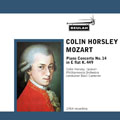 Originally
released with music by Liszt and Chopin on HMV CLP1012, this
recording was reissued on HMV Concert Classics in 1962, more
appropriately coupled with the Horsley/Brain performance of
the Mozart Piano Quintet reviewed below. By comparison
with more recent interpretations of this concerto, such as the
Naxos/Jandó mentioned above, the performance is a little
unimaginative, but the solo playing is well worth hearing and
the recording - already regarded as rather dry in 1962 - sounds
somewhat more dated than Decca recordings of the same period,
but the Beulah transfer has brought it up well enough for the
experience to be enjoyable.
Originally
released with music by Liszt and Chopin on HMV CLP1012, this
recording was reissued on HMV Concert Classics in 1962, more
appropriately coupled with the Horsley/Brain performance of
the Mozart Piano Quintet reviewed below. By comparison
with more recent interpretations of this concerto, such as the
Naxos/Jandó mentioned above, the performance is a little
unimaginative, but the solo playing is well worth hearing and
the recording - already regarded as rather dry in 1962 - sounds
somewhat more dated than Decca recordings of the same period,
but the Beulah transfer has brought it up well enough for the
experience to be enjoyable.
Piano Concerto No.23 in A, K488 [26:05]
Denis Matthews (piano); Philharmonia Orchestra/Rudolf Schwarz
- rec. 1954. Mono/ADD.
BEULAH EXTRA 1BX42 [26:05] - from Beulah (mp3)
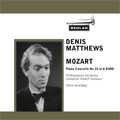 Though
I often think that my favourite Mozart Piano Concerto is the
most recent that I heard from the last eight, Nos. 20 to 27,
if forced to plump, I’d have to choose No.23. It’s not an easy
work to bring off - we really need the virtues of the best half
dozen recording to be somehow combined. Given that we don’t
live in that ideal world, Clifford Curzon with the LSO and István
Kertész (Double Decca) and Imogen Cooper with the Northern
Sinfonia (Avie) would come pretty close to perfection.
Though
I often think that my favourite Mozart Piano Concerto is the
most recent that I heard from the last eight, Nos. 20 to 27,
if forced to plump, I’d have to choose No.23. It’s not an easy
work to bring off - we really need the virtues of the best half
dozen recording to be somehow combined. Given that we don’t
live in that ideal world, Clifford Curzon with the LSO and István
Kertész (Double Decca) and Imogen Cooper with the Northern
Sinfonia (Avie) would come pretty close to perfection.
I can’t remember when or how I came across the 10-inch Columbia
LP on which this Denis Matthews recording was first released,
but it stayed in my memory as also being close to perfection.
In the event, it’s a little more gentle and undemonstrative
than I recalled, but I enjoyed re-hearing it and the recording
has come up well with Beulah’s care.
I've already sung the praises of the Cooper recordings in my
September 2009 Download Roundup.
The Curzon is available as a 2-CD set from passionato.com;
buying it as a download won’t save much - the discs are available
for around the same price - but it obviates the side-break which
the CD format necessitates.
Serenade No.9 in D, K320, ‘Posthorn’ [40:25]
Orchestre de la Suisse Romande/Peter Maag - rec. 1951. Mono/ADD.
BEULAH EXTRA 1BX54, 2BX54, 3BX54 [40:25] - from Beulah (mp3)
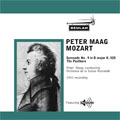 Peter
Maag made later stereo recording of Mozart Serenades and Notturnos
with the LSO. This OSR recording of the Posthorn Serenade
possesses something of a classic status, though at least one
reviewer in 1952 was more than a trifle snooty about the music.
The recording is thinner than the 'Paris’ symphony of one year
later, but it’s good enough not to spoil one’s enjoyment of
a stylish performance, which has also been reissued on the budget-price
Australian Eloquence label, coupled with the less well known
Serenade No.4. (476 9701). The Beulah is good value at
£1.50 if you don’t want everything on the Eloquence set.
Peter
Maag made later stereo recording of Mozart Serenades and Notturnos
with the LSO. This OSR recording of the Posthorn Serenade
possesses something of a classic status, though at least one
reviewer in 1952 was more than a trifle snooty about the music.
The recording is thinner than the 'Paris’ symphony of one year
later, but it’s good enough not to spoil one’s enjoyment of
a stylish performance, which has also been reissued on the budget-price
Australian Eloquence label, coupled with the less well known
Serenade No.4. (476 9701). The Beulah is good value at
£1.50 if you don’t want everything on the Eloquence set.
Serenade No.11 in E-flat, K375 [24:39]
London Baroque Ensemble/Karl Haas - rec. 1952? Stereo?/ADD.
BEULAH EXTRA 1BX83 [24:39] - from Beulah (mp3)
The London Baroque Ensemble contained such luminaries as Jack
Brymer on clarinet and Dennis Brain on horn. Beulah label this
recording '1957 stereo recording', but an LP with the same performers
was released by Parlophone in 1952. It was something or a rarity
then, and, though it can be heard a little more often now, this
recording is still something of a classic - it has also been
reissued by Testament, coupled with Serenade No.12 and
Dvořák’s Op.44 (SBT1180). Once again, the Beulah
is well worth its modest price.
Symphony No.31 in D, K297, 'Paris’ [16:09]
London Symphony Orchestra/Josef Krips - rec. 1952. Mono/ADD
BEULAH EXTRA 1BX46 [16:09] - from Beulah (mp3)
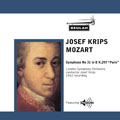 If
you are looking for a modern recording of the 'Paris’ symphony,
you won’t do better than the new recording from Charles Mackerras,
coupled with Nos. 29, 32, 35 and 36 on Linn CKD350 - see my
April 2010 Download Roundup.
If you would like to be reminded that first-rate Mozart performances
are not solely a 21st-century preserve, Josef Krips’ Mozart
is as good a place as any to start. His version of Don Giovanni
still sounds very well indeed and Beulah have magicked this
1952 recording into sounding almost as well as that 1955 Giovanni,
apart, of course, from its being in mono. This is well worth
£1.50 of anyone’s money. Krips and the LSO made some fine
recordings of the Beethoven symphonies, too, for World Record
Club, some of which were my introductions to those works, but
it’s not just nostalgia that makes me warm to this reissue.
If
you are looking for a modern recording of the 'Paris’ symphony,
you won’t do better than the new recording from Charles Mackerras,
coupled with Nos. 29, 32, 35 and 36 on Linn CKD350 - see my
April 2010 Download Roundup.
If you would like to be reminded that first-rate Mozart performances
are not solely a 21st-century preserve, Josef Krips’ Mozart
is as good a place as any to start. His version of Don Giovanni
still sounds very well indeed and Beulah have magicked this
1952 recording into sounding almost as well as that 1955 Giovanni,
apart, of course, from its being in mono. This is well worth
£1.50 of anyone’s money. Krips and the LSO made some fine
recordings of the Beethoven symphonies, too, for World Record
Club, some of which were my introductions to those works, but
it’s not just nostalgia that makes me warm to this reissue.
Quintet for Piano and Wind Instruments in E-flat, K452 [22:44]
Colin Horsley (piano); Dennis Brain Wind Ensemble - rec. 1954
BEULAH EXTRA 1BX84-2BX84-3BX84 [22:44] - from Beulah (mp3)
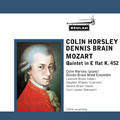 This
recording first appeared on an HMV LP, CLP1029, rather illogically
coupled with Lennox Berkeley’s Trio for violin, viola and
piano. Presumably the idea was to sell newer music alongside
the more familiar. Since then the most usual - almost ubiquitous
- coupling has been with Beethoven’s Quintet for the
same combination of instruments.
This
recording first appeared on an HMV LP, CLP1029, rather illogically
coupled with Lennox Berkeley’s Trio for violin, viola and
piano. Presumably the idea was to sell newer music alongside
the more familiar. Since then the most usual - almost ubiquitous
- coupling has been with Beethoven’s Quintet for the
same combination of instruments.
At least one reviewer of the original liked the performance
but thought the tempo for the finale was slow and pedestrian.
I wonder if he was listening to the same performance, because
I hear as stylish an account of this movement as of the whole
work. At 5:41, Horsley and the Brain Ensemble are a mere trifle
slower than most recent performances - Stephen Hough and the
BPO Wind Ensemble on BIS-CD-132, for example, come in at 5:35
- but not so much so that one could call them sluggish. The
recording is very clear and well balanced for its age.
String Quartet No.19 in C, K465 [26:46]
Quartetto Italiano - rec. 1952. Mono/ADD
BEULAH EXTRA 1BX47-2BX47-3BX47-4BX47 [26:46] - from Beulah (mp3)
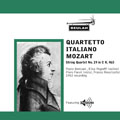 Like
Gervase de Peyer, the Quartetto Italiano made some fine later
Mozart recordings in stereo, though they seem now to have disappeared
from the catalogue, except as downloads. All the more reason,
then, to treasure this well-refurbished 1952 recording. I can’t
think of any modern performance - even the Quartetto Italiano
remake - that outdoes this account and the sound is more than
tolerable - a trifle bass-heavy, but that in no way prevented
my enjoying this download. Passionato have the complete Quartetto
Italiano stereo set of the Mozart Quartets on 422 5122 - here
- and, even better value, the complete Quartets and Quintets,
the lossless version of which was on sale for an incredibly
inexpensive £20.49 when I checked (464 8302 here).
The Passionato download of the 3-CD set of the Quartetto Italiano
in just the last Mozart Quartets, Nos. 14-19, which I
recommended in January 2010 no longer seems to be available.
Like
Gervase de Peyer, the Quartetto Italiano made some fine later
Mozart recordings in stereo, though they seem now to have disappeared
from the catalogue, except as downloads. All the more reason,
then, to treasure this well-refurbished 1952 recording. I can’t
think of any modern performance - even the Quartetto Italiano
remake - that outdoes this account and the sound is more than
tolerable - a trifle bass-heavy, but that in no way prevented
my enjoying this download. Passionato have the complete Quartetto
Italiano stereo set of the Mozart Quartets on 422 5122 - here
- and, even better value, the complete Quartets and Quintets,
the lossless version of which was on sale for an incredibly
inexpensive £20.49 when I checked (464 8302 here).
The Passionato download of the 3-CD set of the Quartetto Italiano
in just the last Mozart Quartets, Nos. 14-19, which I
recommended in January 2010 no longer seems to be available.
Mass in C, K317, 'Coronation' [26:17]
Wilma Lipp (soprano); Christa Ludwig (alto); Murry Dickie (tenor);
Walter Berry (bass); Vienna Oratorio Choir; Vienna Symphony
Orchestra/Jascha Horenstein - rec. 1956, binaural sound. ADD
BEULAH EXTRA 1BX48, 2BX48, 3BX48 [26:17] - from Beulah (mp3)
This recording first appeared in mono on Vox PL10260 in 1958
and in stereo on Turnabout TV34063S in 1966. Turnabout LPs were
marvellous value at 17/6 (88p); some of them offered strong
competition to more expensive recordings and most of them contained
thoroughly reliable performances, decently recorded. This Horenstein
falls into the latter category, with some of the finest Mozart
singers of the day and a genuine feeling for Mozart’s music
from all concerned, but with choral and orchestral support not
in the top rank and a recording which sounds rather congested
by today’s standards, despite Beulah’s best efforts to tidy
it up. I must admit to a particular dislike of the Austro-German
practice of pronouncing Agnus with a hard g, as
heard here, but that is a practice found on most other performances
of this work and it was, presumably, what Mozart expected.
Vesperæ Solennes de Confessore, K339: Laudate
Dominum [4:19]
Ursula van Diemen; Berlin Philharmonic Choir and Orchestra/Ochs
- rec. 1928 (mono)
BEULAH EXTRA 1BX51 [4:19] - from Beulah (mp3)
Van Diemen’s voice comes over loud and clear but the choir and
orchestra are distinctly crumbly. Worth having as a brief memorial
of a famous voice performing a wonderful piece - and one which
was still being used as a benchmark for it for many years afterwards.
For a modern recording of the complete Vespers there’s
a wonderful version from Emma Kirkby and the AAM with Christopher
Hogwood (see below).
Piano Quartets Nos.1 in g minor, K478 [26:36] and 2 in E-flat,
K493 [33:19]
Paul Lewis (piano); Leopold Piano Trio - rec. 2002. DDD.
HYPERION CDA30011 [62:44] - from Hyperion
(mp3 and lossless)
Piano Quartets Nos.1 in g minor, K478 [29:36] and 2 in E-flat,
K493 [34:14]
Malcolm Bilson (fortepiano); Elizabeth Wilcock (violin); Jan
Schlapp (viola); Timothy Mason (cello) - rec. 1987. DDD.
DG ARCHIV AL FRESCO 477 6732 [61:11] - from Passionato.com
(mp3)
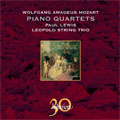 Preferences
between these two excellent recordings may well be settled by
attitudes to period instruments: those who insist on them will
need to turn to the excellent DG Archiv version, while everyone
else will be well satisfied with the Hyperion reissue. Both
are regularly offered at £7.99 - the Passionato was on
special offer at £3.99 when I checked. Though only the
Hyperion has a lossless option, the Passionato mp3 is more than
adequate. Like all the recordings in the Al Fresco series, the
DG has a rather hideous cover, while the Hyperion comes complete
with a pdf booklet.
Preferences
between these two excellent recordings may well be settled by
attitudes to period instruments: those who insist on them will
need to turn to the excellent DG Archiv version, while everyone
else will be well satisfied with the Hyperion reissue. Both
are regularly offered at £7.99 - the Passionato was on
special offer at £3.99 when I checked. Though only the
Hyperion has a lossless option, the Passionato mp3 is more than
adequate. Like all the recordings in the Al Fresco series, the
DG has a rather hideous cover, while the Hyperion comes complete
with a pdf booklet.
Regina cœli, K108 [14:52]; Laudate Dominum from
Vesperae solennes de Confessore, K339 [4:18]; Sub
tuum præsidium, K198 [5:19]; Sancta Maria, mater
Dei, K273 [3:45]; Exsultate, jubilate, K165 [13:42];
Agnus Dei from 'Coronation' Mass, K317 [3:35]; Laudate
Dominum from Vesperae solennes de Domenica, K321
[4:24]; Regina cœli, K127 [14:53]
Carolyn Sampson (soprano); Choir of The King’s Consort; The
King’s Consort/Robert King - rec. October 2005. DDD. Texts and
translations as pdf document.
HYPERION CDA30012 [65:10] - from Hyperion
(mp3 and lossless)
Exsultate, jubilate, K165 (K158a) (Salzburg version,
1780) [13:27]; Regina cœli, K108 (74d) [13:31];
Ergo interest, K143 (74a) [5:36]; Regina cœli,
K127 [5:15]
Emma Kirkby (soprano); Westminster Cathedral Boys’ Choir; Academy
of Ancient Music and Chorus/Christopher Hogwood - rec. 1988/89.
DDD.
DECCA OISEAU LYRE 411 8332 [47:12] - from passionato.com
(mp3)
Vesperæ solennes de confessore, K339 [28:39]; Kyrie
in d minor. K3412 (K368a) [8:20]; Ave verum corpus, K618
[3:48]; Exsultate, jubilate, K165 (K158a) [15:05]
Kiri te Kanawa (soprano), Elizabeth Bainbridge (contralto),
Ryland Davies (tenor), Gwynne Howell (bass); John Constable
(organ); London Symphony Chorus and Orchestra/Colin Davis -
rec. 1971. ADD.
PHILIPS Mozart Collection 475 7058 [55:54] - from passionato.com
(mp3)
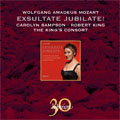 I’m
grateful to Hyperion and their rivals for giving me a reason
to listen to some glorious music which I have tended to neglect
of late. The reappearance of the Hyperion after just five years
is a real bargain in upper-mid-price CD form. The download remains
at £7.99 in mp3 and lossless format, already a bargain
in its own right when most download sites charge £9.99
for lossless. The publicity material claims Carolyn Sampson
as now the best early-music soprano by some distance. I’m glad
that they added the 'now', because the Emma
I’m
grateful to Hyperion and their rivals for giving me a reason
to listen to some glorious music which I have tended to neglect
of late. The reappearance of the Hyperion after just five years
is a real bargain in upper-mid-price CD form. The download remains
at £7.99 in mp3 and lossless format, already a bargain
in its own right when most download sites charge £9.99
for lossless. The publicity material claims Carolyn Sampson
as now the best early-music soprano by some distance. I’m glad
that they added the 'now', because the Emma 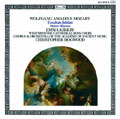 Kirkby
of the very recent past certainly qualified for that accolade
in her prime. I very much enjoyed the Hyperion reissue, but
it is up against very strong competition in Exsultate, jubilate
from both of the rival versions listed here and in the other
items which overlap with one or other of those rivals. If I
ultimately place it on the top of the pile, it’s a very close
run thing indeed, taking into account the availability of texts,
the high quality of the lossless DDD sound against the earlier
recordings - though they are very good, too - and the more generous
playing time. The ethereal quality of Laudate Dominum alone
would sell this recording for
Kirkby
of the very recent past certainly qualified for that accolade
in her prime. I very much enjoyed the Hyperion reissue, but
it is up against very strong competition in Exsultate, jubilate
from both of the rival versions listed here and in the other
items which overlap with one or other of those rivals. If I
ultimately place it on the top of the pile, it’s a very close
run thing indeed, taking into account the availability of texts,
the high quality of the lossless DDD sound against the earlier
recordings - though they are very good, too - and the more generous
playing time. The ethereal quality of Laudate Dominum alone
would sell this recording for 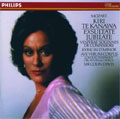 me,
were it not for the superb performance of the whole Vesperæ
... de confessore on the Philips recording, including an
equally ravishing version of this section. To have two Carolyn
Sampsons for the price of one in Sub tuum presidium is
something of a gimmick, but it is tastefully done.
me,
were it not for the superb performance of the whole Vesperæ
... de confessore on the Philips recording, including an
equally ravishing version of this section. To have two Carolyn
Sampsons for the price of one in Sub tuum presidium is
something of a gimmick, but it is tastefully done.
The Decca version is also available on an Eloquence CD (476
7460), of which John Phillips wrote: 'This is a superb issue,
and deserves wide circulation. I can recommend it highly.' (See
review).
The playing time is rather meagre but the excellence of Emma
Kirkby’s singing and Christopher Hogwood’s stylish direction
of the whole proceedings would make this the version of choice
for those who stipulate period instruments - and even those
who sometimes find them a trial will find little here to irk
them - were it not that Robert King equals and perhaps outshines
Hogwood in providing authenticity without tears. Kirkby makes
Sampson sound just slightly plummy in Exsultate, jubilate.
Exchange rate fluctuations and tax changes mean that the Buywell
import of the Eloquence CD now costs £5.44 in the UK,
not the £3.99 stated in JP’s review. The download, in
very good mp3, was reduced to £3.99 when I last looked
(normal price £7.99).
The Philips was also on offer from Passionato at the reduced
price of £3.99 when I checked. This is the version not
just for those who eschew period instruments: its own virtues
are real, not least the singing of Kiri te Kanawa, early in
her career, and Colin Davis’s engagement with the Mozart idiom
here and on other recordings. The playing time is not much more
generous than the Decca but that is a small consideration in
the face of two such excellent performances. The recording sounds
a little dry by comparison with the two newer digital versions.
Don’t forget the Kirkby/Hogwood version of the Vespers
with the Coronation Mass which I recommended in the January
2010 Roundup
(Decca 436 5852).
Ludwig van BEETHOVEN (1770-1827)
Piano Concertos No.1 in C, Op.15 [37:39]; No.2 in B-flat, Op.19
[27:55]; No.3 in c minor, Op.37 [36:54]; No.4 in G, Op.58 [31:42];
No.5 in E-flat, Op.73 ('Emperor') [37:22]; Choral Fantasia,
Op.80 [19:11]; Rondo for piano and orchestra in B-flat, WoO
6 [9:00]; Piano Sonata No.32 in c minor, Op.111 [25:24]; ’diabelli'
Variations [46:23]; Polonaise in C, Op.89 [5:04]
Julius Katchen (piano); London Symphony Orchestra/Pierino Gamba
- rec. 1955-1968. ADD.
DECCA 475 8449 [4CDs: 4:36:34] - from Passionato.com
(mp3)
Piano Concerto No.5 in E-flat, Op.73 ('Emperor')
Andor Foldes (piano); Berlin Philharmonic Orchestra/Ferdinand
Leitner - rec.1959. Stereo/ADD
BEULAH EXTRA 1BX96-2BX96 [38:48] - from Beulah
(mp3)
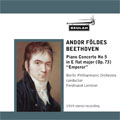 These
recordings have somehow got trapped in a limbo between the historic
and more recent versions, a position exacerbated in the case
of Foldes by the existence of the classic cycle which
Wilhelm Kempff made, with Ferdinand Leitner again at the helm
- only Nos.4 and 5 appear to be currently available from that
set (DG Originals 447 4022), though Passionato have the complete
set to download (427 2372 - here).
On its original issue and again when reissued on the Heliodor
label, reviewers tended to praise the Foldes, but ultimately
preferred the likes of Curzon and Knappertsbusch. Even with
the latter having apparently
These
recordings have somehow got trapped in a limbo between the historic
and more recent versions, a position exacerbated in the case
of Foldes by the existence of the classic cycle which
Wilhelm Kempff made, with Ferdinand Leitner again at the helm
- only Nos.4 and 5 appear to be currently available from that
set (DG Originals 447 4022), though Passionato have the complete
set to download (427 2372 - here).
On its original issue and again when reissued on the Heliodor
label, reviewers tended to praise the Foldes, but ultimately
preferred the likes of Curzon and Knappertsbusch. Even with
the latter having apparently 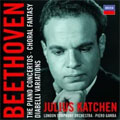 fallen
out of the catalogue (last seen on mid-price Decca 467 1262;
still available as an mp3 download from Passionato here) there
are too many first-rate Emperors to place this reissue
at the top of the tree, but I did greatly enjoy hearing it -
a welcome reminder of a talented performer at a very modest
price. The sound is open and fresh. Beulah spell the name Földes,
which is strictly correct though unfamiliar: he dropped the
accent when he became a US citizen.
fallen
out of the catalogue (last seen on mid-price Decca 467 1262;
still available as an mp3 download from Passionato here) there
are too many first-rate Emperors to place this reissue
at the top of the tree, but I did greatly enjoy hearing it -
a welcome reminder of a talented performer at a very modest
price. The sound is open and fresh. Beulah spell the name Földes,
which is strictly correct though unfamiliar: he dropped the
accent when he became a US citizen.
Katchen and Maag may offer understated performances,
but they never undervalue the music. Like the Foldes recording,
this set is in danger of being overlooked in a way that it never
should be. In their Ace of Diamonds manifestations, with prints
of 18th-century Vienna, these performances were my benchmarks
for the Beethoven concertos and they remain high in my estimation
alongside the roughly contemporary recordings of Stephen Kovacevich
and Colin Davis (Nos.1-4 on Philips Duo 442 5772 from Passionato,
No.5 not currently available. 2 and 4 also available on an SACD
from PentaTone PTC5186101). Where Katchen scores is the inclusion
of the much under-rated Choral Fantasia - regard it as a trial
run for the choral finale of the Ninth Symphony. Like the performances,
the sound is unspectacular but satisfying.
Passionato also offer the Katchen/Maag performances in alternative
permutations on two 2-CD sets: Concertos 1-3 and 5 on 460 8222
(mp3 and flac); No.4, the Choral Fantasia and Mozart Piano Concertos
Nos. 13, 20 and 25, the last two with Karl Münchinger,
on 460 8252 (mp3). Downloading seems to be currently the only
way of obtaining any of these Katchen Beethoven performances,
apart from the Diabelli Variations, Polonaise and Sonata
No.32, available on CD at budget price (Decca Heritage Masters
478 1727).
Felix MENDELSSOHN (1809-1847)
Overture 'Ruy Blas’
National Symphony Orchestra/Heinz Unger - rec.1945. Mono ADD.
BEULAH EXTRA 1BX33 [7:16] - from Beulah (mp3)
Until replaced by Beecham’s recording, this held sway as the
version of Ruy Blas - a remarkably tuneful work from
a composer who hated the play with which it is connected. The
78 recording has been made to sound well - a trifle muffled,
but you could easily mistake it for an early LP recording -
and the performance is attractive.
Symphony No.3 in a minor, Op.56 (’scottish')
London Philharmonic Orchestra/Georg Solti - rec.1952. Mono/ADD.
BEULAH 4BX16-6BX16 [34:07] - from Beulah (mp3)
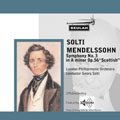 I
liked this much better than at least one contemporary reviewer,
though it was outshone five years later by another Decca recording
from Peter Maag, now coupled with an equally fine account of
the Midsummer Night’s Dream music (466 9902) and later still
by Claudio Abbado, again on Decca (Originals 475 8677), both
of whom are slightly more leisurely than Solti. I appreciate
the way in which Solti avoids the abrupt gear-change which many
conductors make at the transition to the coda in the finale.
The high strings sound a little glassy - even in 1953 this was
remarked on - but the re-mastered sound is otherwise very acceptable.
I enjoyed Solti’s Mendelssohn, but it’s not an urgent recommendation.
I
liked this much better than at least one contemporary reviewer,
though it was outshone five years later by another Decca recording
from Peter Maag, now coupled with an equally fine account of
the Midsummer Night’s Dream music (466 9902) and later still
by Claudio Abbado, again on Decca (Originals 475 8677), both
of whom are slightly more leisurely than Solti. I appreciate
the way in which Solti avoids the abrupt gear-change which many
conductors make at the transition to the coda in the finale.
The high strings sound a little glassy - even in 1953 this was
remarked on - but the re-mastered sound is otherwise very acceptable.
I enjoyed Solti’s Mendelssohn, but it’s not an urgent recommendation.
Felix MENDELSSOHN Capriccio
brillant, Op.22* [8:54]
Camille SAINT-SAËNS (1835-1921)
Piano Concerto No.2 in g minor, Op.22** [22:21]
Moura Lympany (piano)/National Symphony Orchestra/Boyd Neel
- rec.1945 Mono/ADD
London Philharmonic Orchestra/Jean Martinon - rec.1951. Mono/ADD
BEULAH EXTRA 1BX35* [8:54] 2BX35** [22:21] - from
Beulah
(mp3)
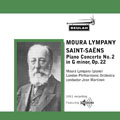 The
Capriccio brillant - no final e on brilliant,
pace Beulah’s cover spelling - usually comes as a coupling with
one or more of the Piano Concertos, for example on Chandos with
Howard Shelley’s excellent account of Concertos 1-2 (CHAN9215)
or Stephen Hough’s equally fine version of the same coupling
plus the Rondo brillant (Hyperion CDA66969). Moura Lympany’s
1945 recording offers an interesting, if hardly urgently recommended,
pendant to her Saint-Saëns. I enjoyed this rather brisk
account - it’s rather faster than Shelley or Hough, perhaps
due to the exigencies of 78 playing times, but it never sounds
rushed. The recording is good for its age.
The
Capriccio brillant - no final e on brilliant,
pace Beulah’s cover spelling - usually comes as a coupling with
one or more of the Piano Concertos, for example on Chandos with
Howard Shelley’s excellent account of Concertos 1-2 (CHAN9215)
or Stephen Hough’s equally fine version of the same coupling
plus the Rondo brillant (Hyperion CDA66969). Moura Lympany’s
1945 recording offers an interesting, if hardly urgently recommended,
pendant to her Saint-Saëns. I enjoyed this rather brisk
account - it’s rather faster than Shelley or Hough, perhaps
due to the exigencies of 78 playing times, but it never sounds
rushed. The recording is good for its age.
Barry Coward, the proprietor of Beulah, has included the Moura
Lympany recording of Saint-Saëns because he has lived with
and enjoyed it for over 40 years - what better reason could
there be? The recording is also surprisingly good for its age.
Felix MENDELSSOHN Piano Trio No.1 in d minor,
Op.49
Alfred Cortot (piano), Jacques Thibaud (violin), Pablo Casals
(cello) - rec.1927. Mono/ADD.
BEULAH EXTRA 2BX87-4BX87 [28:38] - from Beulah (mp3)
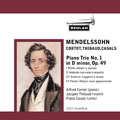 Though
it’s less well known than the same performers’ Haydn 'Gypsy'
Trio, which Beulah have also reissued (1BX87 - see June Roundup)
this recording was well worth reissuing. The same performance
has been reissued on Naxos Historical 8.110185, which I have
not heard. For those not requiring the Schumann coupling there,
the Beulah Extra represents a very worthwhile and less expensive
alternative, and I can’t imagine a better transfer in terms
of frequency range and minimal surface noise. For a modern alternative,
don’t overlook the Florestan Trio’s versions of both Trios (Hyperion
CDA67485 - see my August 2010 Download
Roundup)
Though
it’s less well known than the same performers’ Haydn 'Gypsy'
Trio, which Beulah have also reissued (1BX87 - see June Roundup)
this recording was well worth reissuing. The same performance
has been reissued on Naxos Historical 8.110185, which I have
not heard. For those not requiring the Schumann coupling there,
the Beulah Extra represents a very worthwhile and less expensive
alternative, and I can’t imagine a better transfer in terms
of frequency range and minimal surface noise. For a modern alternative,
don’t overlook the Florestan Trio’s versions of both Trios (Hyperion
CDA67485 - see my August 2010 Download
Roundup)
Frédéric CHOPIN
(1810-1849)
Piano Concertos No.1 in e minor, Op.11 [40:26] and No.2 in f
minor, Op.21 [30:07]; Trois nouvelles Études,
Op. posth. [5:58]
Arthur Rubinstein (piano); New Symphony Orchestra/Stanislaw
Skrowaczewski; Symphony of the Air/Alfred Wallenstein - rec.
1958, 1961. ADD.
RCA Rubinstein Collection, Vol.44: 09026 63044-2 [76:31]
- from Amazon.co.uk
(mp3)
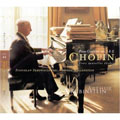 After
experimenting, I return to the recordings which first introduced
me to these concertos, from Rubinstein, now sounding considerably
better in these 1999 re-masterings than they did on LP, though
the orchestral timbre is still rather dry. The concertos alone
are available at mid-price on RCA SACD 82876 67902-2, in which
format they were highly recommended by Ian Lace - here.
Unless you must have the multi-channel version, the download,
which adds the three posthumous Études, comes
in good mp3 (320kb/s) at the bargain price of £3.99. I
find Rubinstein’s performances more idiomatic than any of the
rivals. In the flesh he could be rather variable, with a tendency
to wrong notes - I recall a live broadcast in which he produced
a fistful of these at the start of the Grieg Piano Concerto
and went on to bring the house down. No wrong notes here,
of course, just superb performances.
After
experimenting, I return to the recordings which first introduced
me to these concertos, from Rubinstein, now sounding considerably
better in these 1999 re-masterings than they did on LP, though
the orchestral timbre is still rather dry. The concertos alone
are available at mid-price on RCA SACD 82876 67902-2, in which
format they were highly recommended by Ian Lace - here.
Unless you must have the multi-channel version, the download,
which adds the three posthumous Études, comes
in good mp3 (320kb/s) at the bargain price of £3.99. I
find Rubinstein’s performances more idiomatic than any of the
rivals. In the flesh he could be rather variable, with a tendency
to wrong notes - I recall a live broadcast in which he produced
a fistful of these at the start of the Grieg Piano Concerto
and went on to bring the house down. No wrong notes here,
of course, just superb performances.
Giuseppe VERDI (1813-1901)
Falstaff (excerpts): Act 1. Part1-Ehi paggio!...L'nore
[4:41]
Act 2. Part 2-Presenteremo un bill [10:28]
Act 3. Part 1-Ehi taverniere! [6:24]
Act 3. Part 2-Dal labbro il canto estasiato; Sul fil d'un
sofio [8:10]
Act 1. Part 2 -Alice! Meg! Quickly! Nannetta! [3:50]
Act 2. Part 1 (complete) Siam pentiti e contrite [25:20]
Fernando Corena (bass) - Falstaff; Renato Capecchi (baritone)
- Ford; Luigi Alva (tenor) - Fenton; Robert Bowman (tenor) -
Bardolph; Michael Langdon (bass) - Pistol; Ilva Ligabue (soprano)
- Alice Ford; Lydia Marimpietri (soprano) - Nanetta ; Regina
Resnik (mezzo) - Mistress Quickly
New Symphony Orchestra/Edward Downes - rec. Decca/London July
1963. ADD
HIGH DEFINITION TAPE TRANSFERS HDCD212 [58:56] - from
HDTT
(24/96 or 24/192)
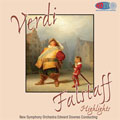 I
wondered what the point was of a series of excerpts from an
essentially unexcerptable opera, especially one which doesn’t
follow the chronological plot: an excerpt from Act 1 precedes
the long extract from Act 2 which concludes the recording, both
of which follow the two extracts from Act 3! Take this, instead,
as a display of Fernando Corena in the role of Falstaff, ably
supported by the other singers and very well directed by Edward
Downes, and its purpose becomes much clearer. With HDTT’s usual
magic at work, on a commercial reel-to-reel tape from London,
it’s easy to recommend, especially since modern technology allows
you to re-order the tracks in chronological order, thus conquering
the vagaries of LP side-lengths. Had this cast made a complete
version, it might well be challenging the hegemony of Gobbi,
Schwarzkopf and Karajan from 1956 (EMI budget price, 3773492:
Bargain of the Month - see review).
If you don’t yet have the EMI, buy it on CD (around £8.50):
the Passionato download will cost you over twice that price,
unless you snap up the half-price offer, available as I write,
here
(£7.99 for mp3, £9.99 for flac).
I
wondered what the point was of a series of excerpts from an
essentially unexcerptable opera, especially one which doesn’t
follow the chronological plot: an excerpt from Act 1 precedes
the long extract from Act 2 which concludes the recording, both
of which follow the two extracts from Act 3! Take this, instead,
as a display of Fernando Corena in the role of Falstaff, ably
supported by the other singers and very well directed by Edward
Downes, and its purpose becomes much clearer. With HDTT’s usual
magic at work, on a commercial reel-to-reel tape from London,
it’s easy to recommend, especially since modern technology allows
you to re-order the tracks in chronological order, thus conquering
the vagaries of LP side-lengths. Had this cast made a complete
version, it might well be challenging the hegemony of Gobbi,
Schwarzkopf and Karajan from 1956 (EMI budget price, 3773492:
Bargain of the Month - see review).
If you don’t yet have the EMI, buy it on CD (around £8.50):
the Passionato download will cost you over twice that price,
unless you snap up the half-price offer, available as I write,
here
(£7.99 for mp3, £9.99 for flac).
César FRANCK (1822-1890)
Psyché - Symphonic Poem
Concertgebouw Orchestra of Amsterdam/Eduard van Beinum - rec.1953.
Mono/ADD
BEULAH EXTRA 6BX37 [20:20] - from Beulah
(mp3)
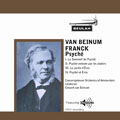 What
we have here should more properly be described as a suite of
excerpts from Psyché - the whole work, with the
choral sections, runs to about 50 minutes - but recordings of
the complete version are not so common even today that we can
afford to sniff at this attractive reissue, which pre-dates
any complete recordings. I think that only Tadaaki Otaka on
Chandos CHAN9342 currently offers the complete work. The performance,
originally issued on the fourth side of a 2-LP set with Bruckner’s
Seventh Symphony, is completely idiomatic. The sound
is very good for its age - it offers no real distraction from
our enjoyment.
What
we have here should more properly be described as a suite of
excerpts from Psyché - the whole work, with the
choral sections, runs to about 50 minutes - but recordings of
the complete version are not so common even today that we can
afford to sniff at this attractive reissue, which pre-dates
any complete recordings. I think that only Tadaaki Otaka on
Chandos CHAN9342 currently offers the complete work. The performance,
originally issued on the fourth side of a 2-LP set with Bruckner’s
Seventh Symphony, is completely idiomatic. The sound
is very good for its age - it offers no real distraction from
our enjoyment.
Karl GOLDMARK (1830-1915)
Rustic Wedding Symphony, Op.26 [47:27]; Sakuntula Overture,
Op.13 [17:51]
Royal Philharmonic Orchestra/Yondani Butt
ASV CDDCA791 [65:18] - from Passionato.com
(mp3)
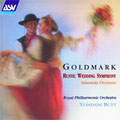 The
symphony used to be a Beecham favourite - would Sony please
restore his long-lost recording? Yondani Butt’s performance
is not in the same league, but he does bring out the charm of
this attractive if modest work, and the recording - clear and
airy in good mp3 - is obviously superior to the old Beecham
Columbia sound in its Philips GBL incarnation. In both respects,
this is preferable to the Utah SO/Maurice Abravanel which resurfaces
from time to time on Vanguard. The Overture doesn’t add much
to the picture.
The
symphony used to be a Beecham favourite - would Sony please
restore his long-lost recording? Yondani Butt’s performance
is not in the same league, but he does bring out the charm of
this attractive if modest work, and the recording - clear and
airy in good mp3 - is obviously superior to the old Beecham
Columbia sound in its Philips GBL incarnation. In both respects,
this is preferable to the Utah SO/Maurice Abravanel which resurfaces
from time to time on Vanguard. The Overture doesn’t add much
to the picture.
Johannes BRAHMS (1833-1897)
Symphonies Nos.1 [44:14]; 2 [39:04]; 3 [36:48] and 4 [39:09];
'Haydn' Variations [17:06]; Alto Rhapsody1 [12:35]; Academic
Festival Overture [10:14]; Tragic Overture [12:38]
1Christa Ludwig; Philharmonia Orchestra/Otto Klemperer - rec.
1954-1962. ADD.
EMI Great Recordings of the Century 5627602 [3CDs: 3:31:50]
- from Passionato.com
(mp3 and lossless)
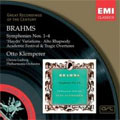 This
recording very narrowly missed becoming my Bargain of the Month
in May, 2009: the only snag was that the very first track, the
theme of the ’St Anthony' Variations contained a huge dropout,
not only in the Amazon version, then on offer for just £3,
but in other versions which I tried. Passionato have clearly
re-sourced the set from US masters - the cover now has the Recording
Angel rather than the UK Nipper - and the fault is no longer
present to mar your enjoyment. Unfortunately, you will have
to pay much more than that £3 offer: the set costs almost
as much as the parent CDs from some suppliers. The Amazon mp3
version now sells for more than Passionato’s lossless version
and much more than the latter’s mp3.
This
recording very narrowly missed becoming my Bargain of the Month
in May, 2009: the only snag was that the very first track, the
theme of the ’St Anthony' Variations contained a huge dropout,
not only in the Amazon version, then on offer for just £3,
but in other versions which I tried. Passionato have clearly
re-sourced the set from US masters - the cover now has the Recording
Angel rather than the UK Nipper - and the fault is no longer
present to mar your enjoyment. Unfortunately, you will have
to pay much more than that £3 offer: the set costs almost
as much as the parent CDs from some suppliers. The Amazon mp3
version now sells for more than Passionato’s lossless version
and much more than the latter’s mp3.
In my 2009
review of Eloquence’s very inexpensive 4-CD set of the Brahms
Symphonies, Overtures, Alto Rhapsody and German Requiem
(OSR/Ansermet, 480 0448) I regularly found myself comparing
Ansermet’s mostly very acceptable performances with those of
Klemperer and preferring the latter.
Ansermet’s Decca recordings were always preferable sound-wise
to Klemperer’s Columbia versions and that remains the case -
Ansermet sometimes sounds a little shrill, Klemperer a little
more so - but Passionato’s transfers are very acceptable, especially
in lossless form, at least better than the original LPs, and
the performances fit the music like a glove, especially in the
case of the third and fourth symphonies, which I have yet to
hear bettered.
String Quintets Nos.1 in F, Op.88 [28:22] and 2 in G, Op.111
[29:37]
Raphael Ensemble (Anthony Marwood, Elizabeth Wexler (violin);
Timothy Boulton, James Boyd (viola); Andrea Hess (cello)) -
rec. April 1995. DDD.
HYPERION HELIOS CDH55369 [57:59] - from Hyperion
(mp3 and lossless)
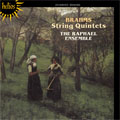 As
recently as June, reviewing the Beulah Extra reissue of the
Budapest Quartet’s version of Op.88 (1BX86, 2BX86 and 3BX86),
I recommended this Raphael Ensemble version as the modern alternative
for both Quintets. Then it was available only via the Archive
Service or as a download for £6.99; the Helios reissue
reduces that download price by £1. The Budapest version
is a classic which fully deserved to be restored and the rather
muddy recording has benefited from Beulah’s attention, but it
clearly cannot compete with Hyperion’s DDD sound. Buy the Raphael
and seriously consider the Budapest in addition - it won’t cost
a fortune to have both versions of this beautiful music.
As
recently as June, reviewing the Beulah Extra reissue of the
Budapest Quartet’s version of Op.88 (1BX86, 2BX86 and 3BX86),
I recommended this Raphael Ensemble version as the modern alternative
for both Quintets. Then it was available only via the Archive
Service or as a download for £6.99; the Helios reissue
reduces that download price by £1. The Budapest version
is a classic which fully deserved to be restored and the rather
muddy recording has benefited from Beulah’s attention, but it
clearly cannot compete with Hyperion’s DDD sound. Buy the Raphael
and seriously consider the Budapest in addition - it won’t cost
a fortune to have both versions of this beautiful music.
Georges BIZET (1838-1875)
Symphony in C (1855) [27:05]
Jeux d'enfants (Petite Suite), Op. 22 (1871) [10:46]
La jolie fille de Perth Suite (1866) [12:15]
L'Orchestre de la Suisse Romande/Ernest Ansermet
rec. October 1960, Victoria Hall, Geneva, Switzerland. ADD
HIGH DEFINITION TAPE TRANSFERS HDCD185 [50:02] - from
HDTT
(24/96 and 24/192)
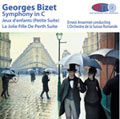 These
recordings have been reissued as part of an Australian Eloquence
3-CD set (480 0457) which Dan Morgan made Bargain of the Month
- see review.
Having since heard the HDTT version, he informs me that he’s
amazed at the improvement in quality over the Eloquence transfers:
he’s kindly sent me his comments for inclusion:
These
recordings have been reissued as part of an Australian Eloquence
3-CD set (480 0457) which Dan Morgan made Bargain of the Month
- see review.
Having since heard the HDTT version, he informs me that he’s
amazed at the improvement in quality over the Eloquence transfers:
he’s kindly sent me his comments for inclusion:
I welcomed the Eloquence reissue of Ansermet’s Bizet - review
- and singled out the Symphony in C for both performance and
sonics. Fifty-year-old recordings don’t come much better than
this; well, I was wrong, for this high-res transfer from HDTT
adds even more lustre to an already desirable collection. True,
the bass in the symphony may seem a little tubby - some may
even characterise it as analogue-like - but the string and wind
sound is reach-out-and-touch tangible. Every nuance and timbre
is heard in a way that scarcely seems possible in a recording
of this - or any other - vintage. Even Bizet’s childish games
are released from the confines of the nursery, these well-shaped
miniatures sounding airier and more detailed than they do on
disc. As for the opera La jolie fille de Perth, it may
not represent Bizet at his best, but these excerpts have the
kind of ear-pricking presence one associates with well-mastered
SACDs. The playing isn’t always immaculate, but just sample
the Prélude with its soft pizzicato lower strings
and glowing harp melodies - what an aural treat this is! Decca’s
engineers did a fine job in Geneva all those years ago, but
only now can we appreciate how remarkable these sessions really
were. A very persuasive introduction to the wide-open world
of high-def downloads.
Dan Morgan
Like Dan, I’m amazed at the quality that has been dug out of
a 4-track Decca-London reel-to-reel recording: even on a top-of-the-range
Ferrograph, I don’t recall ever having heard anything of this
quality - just a hint too much bass, but that’s far better than
the top-heavy transfers which are sometimes made of Decca recordings
- and what happened to the pre-Dolby tape hiss? As on some earlier
occasions, two of the tracks cut out before downloading completely,
but you can easily return and obtain a clean download. As is
so often the case, Safari and Google Chrome both did a better
job than Internet Explorer.
This is Beecham territory - the Symphony and L'Arlésienne
Suites on EMI 5672312, from Passionato in mp3 or lossless
here
- but Ansermet runs him a pretty close second in the Symphony
- I agree with DM that this one work makes the whole programme
worth having. The Eloquence sells at super-budget price - you
can purchase the whole 3-CD set direct from Buywell for around
the same price as the $12US which the HDTT download costs, but
I don’t think you will regret paying the extra for the excellent
24/96 transfer.
Pyotr Ilyich TCHAIKOVSKY (1840-1896)
The Nutcracker - Ballet, Op.71 [87:39]
Jacques OFFENBACH (1819-1880)
Papillon - Ballet in Three Acts [54:43]
National Philharmonic Orchestra/Richard Bonynge - rec.1974,
1972. ADD.
DECCA 444 8272 [2 CDs: 144:31] - from Passionato.com
(mp3)
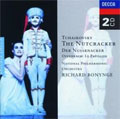 With
Christmas not far around the corner, many will be looking for
an ideal recording of the Nutcracker. You could do far
worse than this Double Decca, apparently now available only
as a download, which comes with the much less well-known Offenbach
Papillon coupling and in a recording which can hold its
own against more recent digital versions, apart from a few,
very brief hiatuses where the music is continuous between tracks.
My top recommendation, however, would still be for another classic
Decca recording, from the OSR and Ernest Ansermet, an inexpensive
purchase on Australian Eloquence (480 0557, with Suites 3
and 4). In its earlier incarnation, on the Decca Weekend
label, that’s still my CD choice. Alternatively, remaining with
downloadable versions, HMV Digital and Amazon.co.uk both have
the LSO/André Previn version on two CfP CDs, with excerpts
from Prokofiev’s Cinderella, for £6.99 (mp3 only),
a fine recording which I have heard only on CD, so I cannot
vouch for the quality of the download from either source.
With
Christmas not far around the corner, many will be looking for
an ideal recording of the Nutcracker. You could do far
worse than this Double Decca, apparently now available only
as a download, which comes with the much less well-known Offenbach
Papillon coupling and in a recording which can hold its
own against more recent digital versions, apart from a few,
very brief hiatuses where the music is continuous between tracks.
My top recommendation, however, would still be for another classic
Decca recording, from the OSR and Ernest Ansermet, an inexpensive
purchase on Australian Eloquence (480 0557, with Suites 3
and 4). In its earlier incarnation, on the Decca Weekend
label, that’s still my CD choice. Alternatively, remaining with
downloadable versions, HMV Digital and Amazon.co.uk both have
the LSO/André Previn version on two CfP CDs, with excerpts
from Prokofiev’s Cinderella, for £6.99 (mp3 only),
a fine recording which I have heard only on CD, so I cannot
vouch for the quality of the download from either source.
Emmanuel CHABRIER (1841-1894)
Habañera
National Symphony Orchestra/Roger Désormière -
rec.1947. Mono/ADD
BEULAH EXTRA 2BX17 [3:58] - from Beulah
(mp3)
A short but sweet pendant to Désormière’s recording
of the Scarlatti/Tommasini Good Humoured Ladies (Beulah
1BX17 - see July Roundup).
Gustav MAHLER (1850-1911)
Des Knaben Wunderhorn [49:12]; Symphony No.10 - Adagio
[24:04]
Magdalena Kožená (mezzo), Christian Gerhaher (baritone);
Cleveland Symphony Orchestra/Pierre Boulez - rec. live, February
2010. DDD.
DG 477 9060 [73:16] - from Passionato.com(mp3
and lossless)
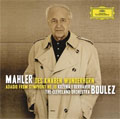 This
already seems to be regarded in some quarters as the modern
replacement for the classic Schwarzkopf/Fischer-Dieskau/LSO/Szell
recording on EMI. There’s some fine orchestral playing and some
very good singing in this final brick in the Boulez Mahler wall,
but the performance of Wunderhorn is oddly tentative
at times and I didn’t find it as involving as the Decca/Chailly
which I recommended as the best of the modern recordings. Kožená
almost persuades me in Wo die schönen Trompeten blasen
as the previous nine tracks had not quite done. It seems an
odd decision to couple the early Wunderhorn with the
Adagio from the incomplete final symphony - the only thing that
links them is the fact that Boulez had not recorded them before.
Whatever one’s opinion of the various completions of the Tenth
Symphony - Boulez thinks them 'rather poor', but I like
both Simon Rattle recordings - the Adagio alone now seems like
the ghost of what might have been.
This
already seems to be regarded in some quarters as the modern
replacement for the classic Schwarzkopf/Fischer-Dieskau/LSO/Szell
recording on EMI. There’s some fine orchestral playing and some
very good singing in this final brick in the Boulez Mahler wall,
but the performance of Wunderhorn is oddly tentative
at times and I didn’t find it as involving as the Decca/Chailly
which I recommended as the best of the modern recordings. Kožená
almost persuades me in Wo die schönen Trompeten blasen
as the previous nine tracks had not quite done. It seems an
odd decision to couple the early Wunderhorn with the
Adagio from the incomplete final symphony - the only thing that
links them is the fact that Boulez had not recorded them before.
Whatever one’s opinion of the various completions of the Tenth
Symphony - Boulez thinks them 'rather poor', but I like
both Simon Rattle recordings - the Adagio alone now seems like
the ghost of what might have been.
Stick with the EMI/Szell (5672362 - from Passionato,
mp3 or lossless) or Decca/Chailly (467 3482 - see August 2009
Roundup);
the latter includes more music than the twelve songs offered
by DG. Lovers of Janet Baker - and I am definitely one - will
never wish to be without the recording which she made with Geraint
Evans and Wyn Morris for the Delysé label, now available
from High Definition Tape Transfers HDCD144 - see the August
2010 Download Roundup.
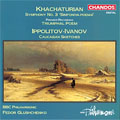 Mikhail
IPPOLITOV-IVANOV (1859-1935)
Mikhail
IPPOLITOV-IVANOV (1859-1935)
Caucasian Sketches, Op.10 [25:10]
Aram KHACHATURIAN (1903-1978)
Symphony No.3 (Symphonic Poem) [24:53]; Triumphal Poem [18:26]
BBC Philharmonic/Fedor Glushchenko - rec. live 1993. DDD
CHANDOS CHAN9321 [69:17] - from theclassicalshop.net
(mp3 and lossless)
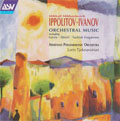 Mikhail
IPPOLITOV-IVANOV
Mikhail
IPPOLITOV-IVANOV
Jubilee March [5:57]; Caucasian Sketches Suite No.2 (Iveria)
[20:35]; Mtsiri [19:45]; Armenian Rhapsody [6:56]; Turkish
March [4:21]; Turkish Fragments [15:29]
Armenian Philharmonic Orchestra/Loris Tjeknavorian - rec.1999.DDD
ASV CDDCA1102 [77:08] - from Passionato.com
(mp3 and lossless)
It’s easy to be snooty about Ippolitov-Ivanov’s music, and even
the Procession of the Sardar from the Caucasian Sketches
is less frequently performed these days, but it’s hugely enjoyable.
The same is true of the Khachaturian Symphony and Triumphal
Poem. If you enjoy the Sketches, it’s worth exploring
the second Suite on ASV. Both recordings offer warm-blooded
performances, well recorded.
Ralph VAUGHAN WILLIAMS (1872-1958)
The complete symphonies - Boult’s 1950s mono cycle
Symphony No. 1 A Sea Symphony (1909) [67:46]
Symphony No. 2 A London Symphony (1913) [43:58]
Symphony No. 3 A Pastoral Symphony (1921) [34:57]
Symphony No. 4 (1931) [33:54]
Symphony No. 5 (1943) [36:34]
Symphony No. 6 (1947) [38:33]
Symphony No. 7 Sinfonia Antartica (1952) [44:53]
Symphony No. 8 (1955)* [28:05]
Symphony No. 9 (1956)* [34:53]
John Cameron (tenor); Isobel Baillie (soprano); London Philharmonic
Choir; London Philharmonic Orchestra/Adrian Boult - rec. 1952-58.
Mono/stereo*. ADD
DECCA BRITISH MUSIC COLLECTION 473 241-2 [5CDs: 67.46
+ 79.30 + 72.17 + 74.21 + 73.22] - from Passionato.com
(mp3) [See review by MWI Classical Editor Rob Barnett -
here.]
- As above
CLASSICAL MASTERS (no number) - from Amazon.co.uk
(mp3)
Concerto for two pianos and orchestra in C (revised version
of Piano Concerto)* [25:46]
Job, a Masque for Dancing [44:17]
Vita Vronsky, Victor Babin (pianos)*; London Philharmonic Orchestra*;
London Symphony Orchestra/Sir Adrian Boult - rec. 1968 and 1970.
ADD.
EMI CLASSICS 5672202 [70:03] - from Passionato.com
(mp3 and lossless)
Job, a Masque for Dancing [44:40]
Overture: The Wasps [10:31]
London Philharmonic Orchestra/Sir Adrian Boult
EVEREST CD009 [55:11] - from eMusic
(mp3)
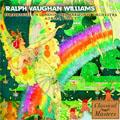 No
sooner had I recommended the mono Boult recording of the Fifth
Symphony (9.80372) from classicsonline - see October 2010
Roundup - than I discovered on the Bulletin Board that Amazon.co.uk
were offering the Classical Masters complete set for a mere
£6.99. My thanks to Nick Barnard for the information and
for the hyperlink - typing 'Vaughan Williams Boult' into the
Amazon search box will bring you only the Decca set.
No
sooner had I recommended the mono Boult recording of the Fifth
Symphony (9.80372) from classicsonline - see October 2010
Roundup - than I discovered on the Bulletin Board that Amazon.co.uk
were offering the Classical Masters complete set for a mere
£6.99. My thanks to Nick Barnard for the information and
for the hyperlink - typing 'Vaughan Williams Boult' into the
Amazon search box will bring you only the Decca set.
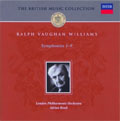 These
classic accounts still hold an important place in the affections
of VW fans, even in preference to the stereo remakes for HMV,
still available from EMI. The recording is inevitably dated,
but perfectly tolerable, especially in the Passionato version,
which comes at the full mp3 bit-rate of 320kb/s. The Classical
Masters version is offered mostly at 160kb/s, the inadequate
bit-rate to which BBC Radio 3 resorts when 32k of their allocation
is 'borrowed' by Radio 5 Sports, with a few tracks at a more
acceptable 192k. Amazon’s 320k is not twice as good as 160k,
but there is an audible difference, especially in the Sea
Symphony, which sounds a little less constricted. The garish
Classical Masters cover is also something of a put-off. Whether
that merits almost four times the asking price, only you can
decide - but bear in mind that £24.99 for five CDs is
still good value. On offer at half that price in late October,
so worth checking a.s.a.p.
These
classic accounts still hold an important place in the affections
of VW fans, even in preference to the stereo remakes for HMV,
still available from EMI. The recording is inevitably dated,
but perfectly tolerable, especially in the Passionato version,
which comes at the full mp3 bit-rate of 320kb/s. The Classical
Masters version is offered mostly at 160kb/s, the inadequate
bit-rate to which BBC Radio 3 resorts when 32k of their allocation
is 'borrowed' by Radio 5 Sports, with a few tracks at a more
acceptable 192k. Amazon’s 320k is not twice as good as 160k,
but there is an audible difference, especially in the Sea
Symphony, which sounds a little less constricted. The garish
Classical Masters cover is also something of a put-off. Whether
that merits almost four times the asking price, only you can
decide - but bear in mind that £24.99 for five CDs is
still good value. On offer at half that price in late October,
so worth checking a.s.a.p.
I’m pleased that both sets include the Ninth: when Decca
failed to complete the set, Everest took up the challenge with
a good stereo version which was licensed to World Record Club.
As a member of WRC, I actually got to know the neglected Ninth
in more detail than any of the earlier symphonies. The separate
classicsonline downloads of the Naxos Classical Archives versions
of these recordings, at 320kb/s, remain good value at £1.99
each - and they can be streamed from the Naxos Music Library,
though not in the USA.
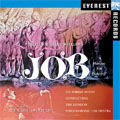
The one major work not included in the Decca set is Job,
a work which VW dedicated to Boult. Boult recorded it in mono
but we were again indebted to Everest for his first stereo version.
That recording, coupled with The Wasps Overture, still
sounds well and it comes on just two tracks from eMusic - potentially
less than £0.50, so a superb bargain.
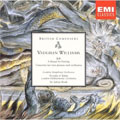 On
the later EMI recording, the work again receives a splendid
performance, this time from the LSO under Boult’s direction
and the 2-Piano Concerto makes an excellent coupling:
I find this more impressive in its original version for single
piano - there are fine versions, notably on Lyrita SRCD.211
(Howard Shelley and Vernon Handley – see review
and my January 2009 Roundup)-
but most listeners will probably prefer the 2-piano revision.
The Passionato transfer is excellent. This and the Decca box
were on offer at half price when I downloaded them: the reduction
is unlikely still to be operative when you read the review,
but their regular special offers are worth checking out.
On
the later EMI recording, the work again receives a splendid
performance, this time from the LSO under Boult’s direction
and the 2-Piano Concerto makes an excellent coupling:
I find this more impressive in its original version for single
piano - there are fine versions, notably on Lyrita SRCD.211
(Howard Shelley and Vernon Handley – see review
and my January 2009 Roundup)-
but most listeners will probably prefer the 2-piano revision.
The Passionato transfer is excellent. This and the Decca box
were on offer at half price when I downloaded them: the reduction
is unlikely still to be operative when you read the review,
but their regular special offers are worth checking out.
Vernon Handley’s excellent Classics for Pleasure Job
seems not to be available as a download - at around £5,
with a generous coupling, buy the CD - but Amazon.co.uk have
Andrew Davis’s version, with Walton’s Belshazzar’s
Feast, for £4.99 on CD or as a download. Both offer
strong competition for the EMI Boult, as does his own 1953 version
on classicsonline 9.80375.
A Bunyan Sequence (for three speakers, treble solo, chorus
and orchestra. Text and music adapted by Christopher Palmer
from the 1942 radio version of The Pilgrim’s Progress)
Prologue [5:17]
The Kingdom [3:17]
The Gate [2:59]
The Way [4:24]
The Shepherd [3:40]
The Palace Beautiful [4:52]
Apollyon [5:03]
Vanity Fair [6:11]
The Trial [7:19]
Giant Despair [4:43]
The Delectable Mountains [14:20]
Epilogue [1:41]
Sir John Gielgud; Richard Pasco; Ursula Howells; Aidan Oliver;
Corydon Singers
City of London Sinfonia/Matthew Best - rec. 1990. DDD. Texts
available as pdf document.
HYPERION CDA66511 [63:46] - from Hyperion
(mp3 and lossless)
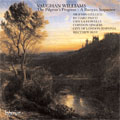 Though
we have two excellent versions of the complete opera from Boult
(EMI) and Hickox (Chandos), this Christopher Palmer arrangement
of the 1942 radio adaptation of material from it - some of which
never found its way into the final version - deserves to be
regarded as a work in its own right, especially in such a fine
performance. Gielgud and company evoke the 'BBC English' of
that broadcast, though their speaking voices are recorded at
a disappointingly low level - they would never have been heard
above the AM static at this level. Otherwise the recording and
transfer are very good.
Though
we have two excellent versions of the complete opera from Boult
(EMI) and Hickox (Chandos), this Christopher Palmer arrangement
of the 1942 radio adaptation of material from it - some of which
never found its way into the final version - deserves to be
regarded as a work in its own right, especially in such a fine
performance. Gielgud and company evoke the 'BBC English' of
that broadcast, though their speaking voices are recorded at
a disappointingly low level - they would never have been heard
above the AM static at this level. Otherwise the recording and
transfer are very good.
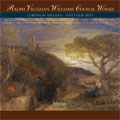 The
original CD is now available only from the Archive Service or
as part of the 4-CD set, CDS44321/4 – see review
and review
– which is also available to download at special price. That
set also offers an earlier (1920) version of some of the Pilgrim’s
Progress material: The Shepherds of the Delectable Mountains.
That CD is no longer available separately, even from the archive,
but the items included on it may be downloaded separately -
The Shepherds for £2.70 in either format. The texts
may be found on the webpage for the set.
The
original CD is now available only from the Archive Service or
as part of the 4-CD set, CDS44321/4 – see review
and review
– which is also available to download at special price. That
set also offers an earlier (1920) version of some of the Pilgrim’s
Progress material: The Shepherds of the Delectable Mountains.
That CD is no longer available separately, even from the archive,
but the items included on it may be downloaded separately -
The Shepherds for £2.70 in either format. The texts
may be found on the webpage for the set.
If you are thinking of purchasing the 4-CD set, be aware that
it also contains the Serenade to Music, etc., which has
just been reissued on CDA30025, reviewed in last month’s Roundup.
Ralph VAUGHAN WILLIAMS On
Wenlock Edge [21:00]
Ivor GURNEY (1890-1937)
Ludlow and Teme [20:01]
Ian VENABLES (b.1955) Songs
of Eternity and Sorrow, Op.36 [16:36]
Andrew Kennedy (tenor); Dante Quartet; Simon Crawford-Phillips
(piano) - rec. 2007. DDD.
SIGNUM SIGCD112 [57:38] - from Passionato.com
(mp3)
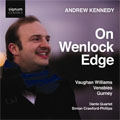 Andrew
Kennedy’s Wenlock Edge strongly challenges earlier recommendations.
Vaughan Williams’ dramatic settings of Housman are coupled with
Ivor Gurney’s generally quieter reflections, also on poems from
A Shropshire Lad and Ian Venables’ Songs of Eternity
and Sorrow, all very fine music. I hadn’t heard Ian Venables’
music before, though I had heard the whole of Kennedy’s Wenlock
Edge on a BBC Music cover-mount CD and been impressed; it
was the new Naxos CD of Venables’ songs (8.572514) that encouraged
me to hear the rest of the Signum CD. I was not disappointed:
this is some of the most powerful and affective music on the
CD, by no means put to shame by the music of the other two composers.
Andrew
Kennedy’s Wenlock Edge strongly challenges earlier recommendations.
Vaughan Williams’ dramatic settings of Housman are coupled with
Ivor Gurney’s generally quieter reflections, also on poems from
A Shropshire Lad and Ian Venables’ Songs of Eternity
and Sorrow, all very fine music. I hadn’t heard Ian Venables’
music before, though I had heard the whole of Kennedy’s Wenlock
Edge on a BBC Music cover-mount CD and been impressed; it
was the new Naxos CD of Venables’ songs (8.572514) that encouraged
me to hear the rest of the Signum CD. I was not disappointed:
this is some of the most powerful and affective music on the
CD, by no means put to shame by the music of the other two composers.
Kennedy’s voice has the flexibility to respond to all the moods
on this recording and possesses a very impressive tonal range,
with an almost baritonal quality at its lower edge; he is very
well supported by the Dante Quartet and Simon Crawford-Phillips.
With its appropriate coupling, this now becomes my benchmark
for the VW, even in preference to Mark Padmore and the Schubert
Ensemble on Chandos with the VW Piano Quintet as coupling
(CHAN10465).
If, however, you require the third leg of the VW/Gurney Housman
trilogy, Ivor Gurney’s The Western Playland, which includes
the setting of the wonderful Loveliest of Trees, you
will need to turn to the fine recording of all three works on
an inexpensive Hyperion Helios recording, CDH55187 (Adrian Thompson,
Stephen Varcoe, Delmé Quartet and Ian Burnside – see
review
. The full-price original of this recording has been a regular
visitor to my CD player for many years.
Ottorino RESPIGHI (1879-1936)
Feste Romane [24:24]
London Symphony Orchestra/Sir Eugene Goossens - rec. Everest,
1959. ADD
Gli Uccelli (The Birds) [16:02]; Brazilian Impressions
[19:07]
London Symphony Orchestra/Antal Doráti - rec. Mercury,
1957. ADD
HIGH DEFINITION TAPE TRANSFERS HDCH213 [58:02] - from
HDTT
(24/96 and 24/192 flac)
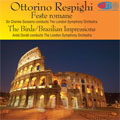 The
coupling here provides a welcome change from the usual Pines
and Fountains of Rome plus one other item. I have to
admit that I find Feste Romane a brash and rather empty
work, not redeemed by the present recording, though I don’t
associate Eugene Goossens with any degree of brashness - I’m
sure he does his best in that regard. The Everest recording
is of much the same vintage as the Everest VW Job (above)
and the First Hand transfer of the Boult recordings of Walton,
Elgar and Britten (below); like them, it has come up very well
indeed in this transfer from reel-to-reel tape. For Antonio
Pappano’s rather more sensitive recording of Feste Romane
(EMI 3944292; Download of the Month), see my October 2009
Roundup.
The
coupling here provides a welcome change from the usual Pines
and Fountains of Rome plus one other item. I have to
admit that I find Feste Romane a brash and rather empty
work, not redeemed by the present recording, though I don’t
associate Eugene Goossens with any degree of brashness - I’m
sure he does his best in that regard. The Everest recording
is of much the same vintage as the Everest VW Job (above)
and the First Hand transfer of the Boult recordings of Walton,
Elgar and Britten (below); like them, it has come up very well
indeed in this transfer from reel-to-reel tape. For Antonio
Pappano’s rather more sensitive recording of Feste Romane
(EMI 3944292; Download of the Month), see my October 2009
Roundup.
The other items began their lives on Mercury: they are taken
again, not from the original masters but from an open-reel commercial
recording. Once again the sound is astounding considering its
provenance. Though it is less well known than the Pines
and Fountains, older listeners will remember The Birds
as having introduced a BBC television programme about antiques
- an appropriate choice, since it is one of Respighi’s confections
based on the music of baroque composers. I am much more attracted
to this side of Respighi’s music, especially The Birds
and Ancient Airs and Dances, and I enjoyed Doráti’s
idiomatic and delightful performance of a delightful work, apart
from the fact that it follows too hard upon the heels of Feste
Romane. Perhaps HDTT will now oblige with Doráti’s Ancient
Airs - all his Respighi performances are sadly deleted in
the UK. For Tamás Vasary’s recording of The Birds
(Chandos CHAN8913) see my November 2008 Download Roundup.
Brazilian Impressions is the least well known item here:
it’s well worth getting to know and it, too, receives an idiomatic
performance and excellent recording. The two Mercury items come
with more air around the sound than the (appropriately) close-up
recording of Feste Romane.
Darius MILHAUD (1892-1974)
Suite pour Violin, Clarinet et Piano, Op. 157b (1936)
Jacques Parrenin (violin), Ulysse Delécluse (clarinet)
and Annette Haas-Hamburger (piano). rec. c.1952. Originally
released in 1953 in the UK (Felsted RL89006) and in the USA
on Period SPL 563.
Suite Symphonique No. 2 ('Protée'), Op.
57 (1919)
San Francisco Symphony Orchestra/Pierre Monteux.
rec.14 April 1945, from RCA Victor 11-8977, 11-8978 and 11-8979.
Troisième Symphonie pour petite orchestre ('Sérénade'),
Op. 71 (1921)
Jean Pougnet (violin), Anthony Pini (cello), Reginald Kell (clarinet),
Paul Draper (bassoon), George Eskdale (trumpet)/Walter Goehr.
rec. 30 September 1936, from Columbia DB1788.
Sérénade pour orchestre, Op.62 (1920/1)
Cinq Études pour piano et orchestre, Op. 63* (1920)
Suite de l'opéra 'Maximilien', Op.110b (arr .1950)
Trois Rag Caprices, Op. 78 (1922)
Vienna Symphony Orchestra/Henry Swoboda (*with Paul Badura-Skoda,
piano). Rec. 1950. From Westminster WL5051. All tracks remastered
by Pristine Audio.
DIVINE ART HISTORIC SOUND DDH27807 [79:30] - from theclassicalshop.net
(mp3 and lossless)
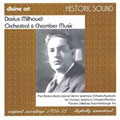 MWI
Classical Editor Rob Barnett summed up: 'This is a distinctive
entry in the Milhaud lists. These are comparatively early works
and valuable for that. Milhaud speaks in a language shot through
with Latin-American carnival, peppery dissonance, jazzy insouciance,
nervy neo-classicism, pastoral repose and souped up, whooping,
if strangely cold, exuberance.' (See review).
MWI
Classical Editor Rob Barnett summed up: 'This is a distinctive
entry in the Milhaud lists. These are comparatively early works
and valuable for that. Milhaud speaks in a language shot through
with Latin-American carnival, peppery dissonance, jazzy insouciance,
nervy neo-classicism, pastoral repose and souped up, whooping,
if strangely cold, exuberance.' (See review).
These are not the usual suspects that one finds on Milhaud recordings,
but everything here is hugely enjoyable. I’m amazed at the quality
of the recordings, even on the track dating from 1936, the result
of expert reworking by Pristine Audio. I’m not the greatest
fan of old recordings, but I've been amazed recently at the
quality of re-mastering done by the likes of Pristine, HDTT,
Naxos and Beulah. The download does the original full justice,
especially in the lossless format, and it comes with the booklet
to which RB referred. One track failed to download the first
time but presented no problem when I tried again.
Edmund RUBBRA (1901-1986) Complete
Symphonies
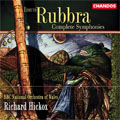 BBC
National Orchestra of Wales/Richard Hickox - rec. 1994-98. DDD.
BBC
National Orchestra of Wales/Richard Hickox - rec. 1994-98. DDD.
CHANDOS CHAN9944 [5 CDs for the price of 4: 324:36] -
from theclassicalshop.net
(mp3 and lossless)
I started to review the component discs of this set in 2009:
Symphonies No.3, Op.49 and No.7, Op.88
BBC National Orchestra of Wales/Richard Hickox
CHANDOS CHAN9634 [70:21]– from theclassicalshop.net
mp3 and lossless) (See January 2009 Roundup)
Symphonies No.5 in B-flat, Op.63 and No.8 (Hommage à
Teilhard de Chardin), Op.132; Ode to the Queen, Op.83
BBC National Orchestra of Wales/Richard Hickox
CHANDOS CHAN9714 [63:50] – from theclassicalshop.net
(See February 2009 Roundup)
I also recommended as an alternative:
Symphonies No.6 and No.8 (Hommage à Teilhard de Chardin);
Soliloquy for Cello and Orchestra
Philharmonia Orchestra/Norman del Mar; Rohan de Saram; LSO/Vernon
Handley
LYRITA SRCD.234 [72:34] – from eMusic.
Please see my January 2009 Roundup
and my earlier full review – here
– in which I gave this Lyrita recording a narrow preference
over the Chandos versions. (Incidentally, for some reason now
unknown to me, I referred to the Soliloquy twice in that
review as Invocation.)
If you followed my advice, you may well wish to explore Rubbra’s
music further via the complete Chandos set or individually on
Chandos or Lyrita. Truthfully, I need only list the complete
set and point to the excellence of all the performances and
recordings. All you lose by buying the set are the wonderful
Samuel Palmer illustrations and you can download these separately
free of charge.
The remaining Chandos separate albums are:
Symphony No.1, Op.44 [34:36]; A Tribute, Op. 56 [4:29]; Sinfonia
Concertante, Op.38 [31:51]
Howard Shelley (piano); BBC National Orchestra of Wales/Richard
Hickox - rec. 1995-96. DDD.
CHANDOS CHAN9538 [70:37] - from theclassicalshop.net
(mp3 and lossless)
Symphonies No.2 in D, Op.45 [33:20] and No.6, Op.80 [34:05]
BBC National Orchestra of Wales/Richard Hickox - rec. 1996.
DDD.
CHANDOS CHAN9481 [67:08] - from theclassicalshop.net
(mp3 and lossless)
Symphonies Nos.4, Op.53 [28:12], 10 'Sinfonia da camera',
Op.145 [14:58] and 11 (for Colette) [Op.153]
BBC National Orchestra of Wales/Richard Hickox - rec 1993-94.
DDD.
CHANDOS CHAN9401 [58:02] - from theclassicalshop.net
(mp3 and lossless)
The Morning Watch, Op.55 [12:48]; Symphony No.9, 'Sinfonia
Sacra', Op.140 [43:59]
Lynn Dawson (soprano); Della Jones (contralto); Stephen Roberts
(bass)
BBC National Chorus and Orchestra of Wales/Richard Hickox -
rec. 1993-94. DDD.
CHANDOS CHAN9441 [56:37] - from theclassicalshop.net
(mp3 and lossless)
For those buying the complete symphonies, the fillers are gathered
together on:
Sinfonia Concertante [31:47]; A Tribute [4:27]; The Morning
Watch [12:44]; Ode to the Queen [13:12]
CHANDOS CHAN9966 [61:44] - from theclassicalshop.net
(mp3 and lossless)
Alternative Lyrita recordings:
Symphonies No.2 [34:28] and No.7 [35:38]; Festival Overture,
Op.62 [7:18]
New Philharmonia Orchestra/Vernon Handley; London Philharmonic
Orchestra/Sir Adrian Boult
LYRITA SRCD.235 [77:39] - from eMusic
(mp3)
Symphonies Nos.3 [32:34] and 4 [26:59]; A Tribute, Op.56 [5:02];
Overture: Resurgam [7:58]
Philharmonia Orchestra/Norman del Mar
LYRITA SRCD.202 [72:29] - from eMusic
or Amazon(mp3)
Colin Clarke wrote of SRCD.235: 'If any disc can confirm the
stature of Edmund Rubbra as symphonist, this is it ... With
a healthy playing time of over 77 minutes, this is a major issue.
All lovers of Rubbra’s music should jump at the chance of picking
up a copy.' (See review).
He thought SRCD.202 the ideal introduction to Rubbra’s music
– see review. These
CDs offer the only available versions of the Festival Overture
and Resurgam. (Buy these tracks separately, from eMusic
or Amazon, if you opt for the Chandos versions of the symphonies.)
I find it hard to choose between these Lyritas and the Chandos
versions: if price is an issue, you may prefer the eMusic versions
of the Lyrita recordings, which can be yours for the cost of
8 tracks (potentially less than £2) and 9 tracks respectively.
The tracks on the eMusic downloads range from just below the
acceptable 192kb/s to the maximum 320kb/s, but that didn’t stop
my enjoyment of these excellent performances. Amazon downloads
usually come in 256kb/s format.
Sir William WALTON (1902-198)
Spitfire Prelude and Fugue [8:38]
A Wartime Sketchbook (arranged Christopher Palmer) [25:10]
Suite: 'Escape Me Never' (arranged Christopher Palmer) [11:21]
The Three Sisters: Music for the Film (edited Christopher Palmer)
[8:13]
Suite: 'Battle of Britain' [11:28]
Academy of St Martin in the Fields/Sir Neville Marriner - rec.
1990. DDD.
CHANDOS CHAN8870 [64:37] - from theclassicalshop.net
(mp3 and lossless)
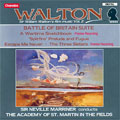 We
owe a considerable debt to Chandos and to Christopher Palmer
for salvaging the music which was commissioned for film The
Battle of Britain and rejected in favour of music by Ron
Goodwin. Goodwin’s substitute may be more cinematic, but all
the music on this Walton collection is well worth hearing. The
booklet - free to download even before you make any purchase
- explains its provenance, so I need not include the details
here. Performances and recording are excellent. I should have
added a note to the Chandos Ron Goodwin Film Music recording
which I reviewed last month that, like all Chandos downloads,
it sounds very good in mp3 as well as in the lossless version.
We
owe a considerable debt to Chandos and to Christopher Palmer
for salvaging the music which was commissioned for film The
Battle of Britain and rejected in favour of music by Ron
Goodwin. Goodwin’s substitute may be more cinematic, but all
the music on this Walton collection is well worth hearing. The
booklet - free to download even before you make any purchase
- explains its provenance, so I need not include the details
here. Performances and recording are excellent. I should have
added a note to the Chandos Ron Goodwin Film Music recording
which I reviewed last month that, like all Chandos downloads,
it sounds very good in mp3 as well as in the lossless version.
Sir Adrian Boult. The 1956 Nixa-Westminster stereo recordings,
Vol. 1
Sir William WALTON (1902-1983)
Symphony No. 1 in b-flat minor [43:17]
Sir Edward ELGAR (1857-1934)
Falstaff - Symphonic Study in c minor, Op. 68* [33:48]
Symphony No. 2 in E-flat, Op. 63 [52:33]
Cockaigne, 'In London Town' - Concert Overture, Op. 40 [14:02]
Benjamin BRITTEN (1913-1976)
Soirées musicales, Op. 9** [9:59]
The Young Person’s Guide to the Orchestra - Variations and Fugue
on a Theme of Purcell, Op. 34 (Narration: Sir Adrian Boult)**
[19:38]
Matinées musicales, Op. 24** [13:13]
Four Sea Interludes Op. 33a and Passacaglia, Op. 33b (Peter
Grimes)** [24:14]
The Young Person’s Guide to the Orchestra - Variations and Fugue
on a Theme of Purcell, Op. 34** [18:55]
London Philharmonic Orchestra/Sir Adrian Boult
rec. Walthamstow Assembly Hall 15-17 August, 1956; *20 August
1956; ** 30-31 August 1956. ADD.
FIRST HAND RECORDS FHR06 [3 CDs: 77:05 + 76:34 + 75:59]
- from HMV
Digital (mp3)
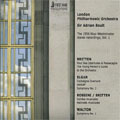 The
sonic qualities of these recordings, even in their mono Nixa
issues, were recognised when they first appeared. As now refurbished,
they sound extremely well indeed. The first reviews of the Walton
praised Boult’s interpretation but with reservations as to whether
he captured the tension as well as Walton himself in his 1953
mono recording. I haven’t heard that Walton recording, but I
have heard some very fine accounts of this symphony, not least
William Boughton’s Nimbus recording, which I praised last month,
especially as it comes more generously coupled than its rivals
and thus is something of a bargain. The First Hand reissue is
even more of a bargain and I certainly didn’t find any lack
of power in Boult’s interpretation - there’s malizia aplenty
in the second movement.
The
sonic qualities of these recordings, even in their mono Nixa
issues, were recognised when they first appeared. As now refurbished,
they sound extremely well indeed. The first reviews of the Walton
praised Boult’s interpretation but with reservations as to whether
he captured the tension as well as Walton himself in his 1953
mono recording. I haven’t heard that Walton recording, but I
have heard some very fine accounts of this symphony, not least
William Boughton’s Nimbus recording, which I praised last month,
especially as it comes more generously coupled than its rivals
and thus is something of a bargain. The First Hand reissue is
even more of a bargain and I certainly didn’t find any lack
of power in Boult’s interpretation - there’s malizia aplenty
in the second movement.
Elgar’s Falstaff, a much under-rated score, and the Second
Symphony also come to life under Boult’s direction. I don’t
share the general enthusiasm for his Lyrita recording of the
two symphonies, preferring Vernon Handley (CfP 5751392 - cheaper
on CD than as a download) and Richard Hickox (Chandos CHSA5038
- see January 2010 Roundup)
in No.2, but this is superb.
John Quinn’s Bargain of the Month – see review
– becomes even more of a bargain if purchased as a 320kb/s download
from HMV Digital UK at £7.99. (Amazon charge the same
£17.99 for the download as for the 3-CD set).
Constant LAMBERT (1905-1951)
Romeo and Juliet - Ballet in two Tableaux [29:51]
Elegiac Blues (in memory of Florence Mills) [2:54]
Piano Concerto (1924) [17:07]
The Bird Actors: Overture [3:18]
Prize Fight - Ballet in one Act [9:12]
Jonathan Plowright (piano); English Northern Philharmonia/David
Lloyd-Jones
HYPERION CDA67545 [61:56] – from Hyperion
(mp3 and lossless)
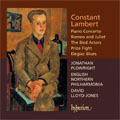 This
has recently made one of those surprise appearances in Hyperion’s
'please buy me' home for unwanted recordings. Despite intense
competition from rival versions of Romeo and Juliet
on Chandos (CHAN9865) and Lyrita (SRCD.215 – Recording of the Month – see
review),
it very much doesn’t deserve to be there. It won’t be reduced
to half price by the time that you read this review, but the
download costs a mere £6.99 in either format - despite
playing for over an hour, it benefits from a £1 reduction
from the usual price.
This
has recently made one of those surprise appearances in Hyperion’s
'please buy me' home for unwanted recordings. Despite intense
competition from rival versions of Romeo and Juliet
on Chandos (CHAN9865) and Lyrita (SRCD.215 – Recording of the Month – see
review),
it very much doesn’t deserve to be there. It won’t be reduced
to half price by the time that you read this review, but the
download costs a mere £6.99 in either format - despite
playing for over an hour, it benefits from a £1 reduction
from the usual price.
Supplement the Hyperion recording with Pomona and Music
for Orchestra from eMusic – here
– or with Pomona from the Chandos recording – here.
Geoffrey BURGON (1941-2010) Requiem
[50:59]
Jennifer Smith (soprano), Ann Murray (mezzo), Anthony Rolfe
Johnson (tenor)
London Symphony Chorus, Wooburn Singers, City of London Sinfonia/Richard
Hickox - rec. London 1981)
Nunc Dimittis [2:59]
Thomas Hopkinson (treble), John Wallace (trumpet); Choir of
King’s College Cambridge/Stephen Cleobury - rec. Cambridge 1996.
DECCA British Music Collection 470 3802 [54:03] – from
Passionato.com
(mp3)
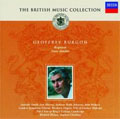 Here
are the two sides of the late Geoffrey Burgon’s music - the
serious and powerful, but approachable Requiem and the
Nunc Dimittis which was popularised by its use as the
theme tune for the TV adaptation of Tinker, Tailor. Richard
Hickox and Stephen Cleobury and their respective teams prove
ideal advocates, the recording is faithful and the mp3 transfer
is good. The CD is no longer listed, so downloading is the only
option. See also MWI review by John Leeman - here.
Here
are the two sides of the late Geoffrey Burgon’s music - the
serious and powerful, but approachable Requiem and the
Nunc Dimittis which was popularised by its use as the
theme tune for the TV adaptation of Tinker, Tailor. Richard
Hickox and Stephen Cleobury and their respective teams prove
ideal advocates, the recording is faithful and the mp3 transfer
is good. The CD is no longer listed, so downloading is the only
option. See also MWI review by John Leeman - here.
At the round earth’s imagined corners [4:40]
The Assumption * [2:33]
Short Mass [10:50]
Of flowers and emeralds sheen * [5:01]
Magnificat [4:33]
Nunc dimittis (1979 version) [2:57]
As the angels stood * [2:04]
Apple Blossom * [3:08]
The Corpus Christi Carol * [4:39]
The song of the creatures * [12:07]
Death be not proud * [3:52]
Come let us pity not the dead * [5:07]
Te Deum * [6:19]
Nunc dimittis (1979, rev.1997) * [3:19]
David Bednall (organ); Alan Thomas (trumpet);
The Choir of Wells Cathedral/Matthew Owens - rec. February 2006.
DDD.
* first recordings. Texts available as pdf document.
HYPERION CDA67567 [72:35] – from Hyperion
(mp3 and lossless)
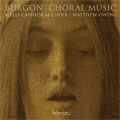 The
Nunc dimittis features here again, in both its original
and revised forms. The recording as a whole offers what John
Quinn aptly described as a ’splendid and comprehensive introduction
to Burgon’s music' - see review
- and the lossless download does it full justice. The CD has
been consigned to the special-order Archive Service but the
download can be yours for half the cost of the parent disc.
If anything, this is even finer than the Decca, but you really
need both.
The
Nunc dimittis features here again, in both its original
and revised forms. The recording as a whole offers what John
Quinn aptly described as a ’splendid and comprehensive introduction
to Burgon’s music' - see review
- and the lossless download does it full justice. The CD has
been consigned to the special-order Archive Service but the
download can be yours for half the cost of the parent disc.
If anything, this is even finer than the Decca, but you really
need both.
Your next stop should be the Chandos recording of the Viola
Concerto and Merciless Beauty (CHAN10592 - from theclassicalshop,
mp3 and lossless) which I recommended in the August Roundup
- here.
See also review by MWI Classical Editor Rob Barnett - here.
In Brief
Robert WHITE (d. 1574)
Christe qui lux es et dies (I) [3:58] ; Ad te levavi
oculos meos [6:36] ; Exaudiat te Dominus [9:23] ;
Miserere mei, Dei [15:37] ; Christe qui lux es et
dies (IV) [6:01] ; Domine quis habitabit (III) [6:49]
; Manus tuae fecerunt me [7:39] ; Lamentations a 6 [17:14]
Gallicantus/Gabriel Crouch
rec. All Hallows, Gospel Oak, London, 7-9 August 2008. DDD.
Booklet with texts from Signum website here.
SIGNUM CLASSICS SIGCD134 [73:19] - from eMusic (mp3)
Many thanks to Robert Hugill, whose appreciative review - here
- led me to this recording. The eMusic download comes in good
sound, mostly at 224 or 225 kb/s, but with a number of typos,
including Christe qui Lex es e dies twice
- two typos in six words, including making Christ the Law of
the day, not its light. The eight tracks potentially cost less
than £2. I've since encountered this group in Dialogues
of Sorrow, music associated with the death of Prince Henry
in 1612 and again very much enjoyed their performances. (Signum
SIGCD210: download from eMusic here).
I can’t vouch for the download quality of the latter, having
reviewed the CD. In both cases, Signum generously provide the
essential booklet as a pdf download to all comers on their website.
'O praise the Lord' - Restoration Music from Westminster
Abbey
William CHILD (1606-1697) O
praise the Lord [2:41]
John BLOW (1649-1708) Voluntary
in A [2:29]; God is our hope and strength [3:20]; Venite
[3:35]
William TURNER (1651-1740) Psalm
113 [2:35]
John BLOW Voluntary in d
minor [2:43]
Henry PURCELL (1659-1695) Benedicite
[7:30]; Benedictus [4:26]; O Lord God of hosts [4:29]
John BLOW Voluntary in d
minor [3:14]; Salvator mundi, salva nos [3:44]
Henry PURCELL Jehova,
quam multi sunt hostes mei [6:27]; Voluntary in d minor
[3:35]; Hear my prayer, O Lord [2:26]
William TURNER
Psalm 54 [2:37]
Henry PURCELL Voluntary
in C [1:27]; Magnificat [3:54]; Nunc dimittis [1:58]; Lord,
how long wilt thou be angry [3:49]; Voluntary in G [3:07]
The Choir of Westminster Abbey/James O’donnell
Robert Quinney (organ)
rec. Westminster Abbey, 11-12, 22-23 June 2009. DDD
Texts available as pdf document.
HYPERION CDA67792 [70:06] - from Hyperion
(mp3 and lossless)
Em Marshall wrote: 'This superb disc presents music associated
with Westminster Abbey ... in the late 1670s and early 1680s
... performed in the Abbey itself by the current Choir, conducted
with flair and proficiency by James O’Donnell ... The men -
on occasion - appear slightly to lack conviction and purpose
when exposed. The boys, on the other hand, are superb throughout...
They sing with both clarity of diction and with intelligence
and imagination. A lovely programme; pleasing sound and balance,
and some exquisite music-making.' (See full review.)
The lossless download sound is most satisfactory. Now I’m looking
forward to a forthcoming Abbey release of music from the reign
of James I (CDA67858 - due for release in February 2011).
Ludwig van BEETHOVEN (1770-1827)
String Quintet in c minor, Op.104 [29:36]; Duo in E-flat ('Eyeglass’
Duo), WoO32 [13:48]; Piano Quartet in E-flat, Op.16 [26:39]
String Quintet in E-flat, Op.4 [29:39]; String Quintet in C,
Op.29 [33:16]
Nash Ensemble
rec. June 2008 (CDA67746) and September 2007 (CDA67693). DDD.
HYPERION CDA67746 [69:56] and CDA67693 [62:38]
- from Hyperion here
and here
(mp3 and lossless)
I gave these recordings a slight edge over the very fine recording
of Opp.29, 104 and 107 by the Fine Arts Quartet and Gil Sharon
on Naxos 8.572221 - see review.
Downloading reduces the price advantage of the Naxos: CDA67693
costs £6.99 and CDA67745 £7.99 against £4.99
for the Naxos from classicsonline.
Einojuhani RAUTAVAARA (b. 1928)
Before the Icons (1955/2005) [25.15]; A Tapestry of Life (2007)
[24.10]
Helsinki Philharmonic Orchestra/Leif Segerstam
rec. Finlandia Hall, Helsinki, 27 October 2006 (Before the Icons),
25 September 2009 (A Tapestry of Life)
ONDINE ODE1149-2 [49:37] - from Passionato.com
(mp3 and lossless)
As Dominy Clements wrote: 'This is an impressive and highly
recommendable disc. Superbly recorded and performed, composer
and conductor Leif Segerstam has assimilated Rautavaara’s idiom
entirely, and draws a synergy of colour and expression from
the Helsinki players which one can hardly imagine being bettered.
This is real music which can be appreciated on many levels,
and which should have a lasting place in contemporary performing
repertoire'. (See full review.)
When I checked in late October, the mp3 and flac versions were
on offer at £5.99 and £7.49 respectively.
Rain WORTHINGTON Shredding
Glass (2004) [10:08]
Czech Philharmonic Orchestra/Robert Ian Winstin
rec. Czech Radio Studio, Studio 1, Prague. DDD.
RAIN WORTHINGTON no number [10:08] - from Amazon (mp3)
Please see Bob Briggs’ review of this and Yet Still Night
- both downloads only - here.
Excerpts from both pieces are available on MySpace here.
Yet Still Night is also available from eMusic as one
track, available on its own, of a 3-CD set of music by contemporary
composers, Masterworks of the New Era - here.
I’m still trying to make up my mind about Rain Worthington,
but it’s well worth investing the one track from eMusic as an
aid to deciding.
Light Music and Jazz-influenced Music
Tielman (or Tylman) SUSATO (c.1510/15-c.1572)
Danserye (1551)
New London Consort/Philip Pickett - rec. 1991. DDD.
DECCA OISEAU LYRE 436 1312 [65:41] - from Passionato.com
(mp3 and lossless)
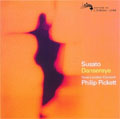 This
was the light music of its age, first rediscovered by David
Munrow and performed by him, then re-edited and presented by
Philip Pickett. Some will prefer David Munrow’s more rough-and-ready
and exuberant style: his version, coupled with Prætorius’s
equally enjoyable Terpsichore and English dance-band
music by Morley, et al, is also available from Passionato on
mp3 and lossless (3592422).
Both were available at a 50% discount at the time of writing
- now no longer available: otherwise it’s less expensive to
buy the Munrow 2-CD set on disc for around £8.50 (3500032).
The Pickett appears to be no longer available on CD, so download
is the only option.
This
was the light music of its age, first rediscovered by David
Munrow and performed by him, then re-edited and presented by
Philip Pickett. Some will prefer David Munrow’s more rough-and-ready
and exuberant style: his version, coupled with Prætorius’s
equally enjoyable Terpsichore and English dance-band
music by Morley, et al, is also available from Passionato on
mp3 and lossless (3592422).
Both were available at a 50% discount at the time of writing
- now no longer available: otherwise it’s less expensive to
buy the Munrow 2-CD set on disc for around £8.50 (3500032).
The Pickett appears to be no longer available on CD, so download
is the only option.
Morton GOULD (1913-1996)
American Symphonette No.2 [10:22]; Concerto for Orchestra [19:44];
Interplay [15:41]; American Symphonette No.3 [12:55]; Chorale
and Fugue in Jazz [16:21]
Albany Symphony Orchestra/David Alan Miller - rec. 2005-2008.
DDD.
ALBANY TR1174 [75:01] - from theclassicalshop
(mp3 and lossless)
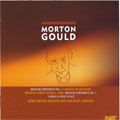 The
mp3 version of this most enjoyable album is this month’s free
offer to those who have signed up for the newsletter at theclassicalshop.net
- another reminder that it’s worth your time to have your email
address added to the list. For those who have missed the offer,
it’s well worth £4.99 of anyone’s money for the mp3 or
£7.99 for the lossless.
The
mp3 version of this most enjoyable album is this month’s free
offer to those who have signed up for the newsletter at theclassicalshop.net
- another reminder that it’s worth your time to have your email
address added to the list. For those who have missed the offer,
it’s well worth £4.99 of anyone’s money for the mp3 or
£7.99 for the lossless.
Five-Fifteen - A Tribute to the BBC Dance Orchestra
Five-Fifteen, BBC; It’s d'lovely; Avenue of Trees; Keep Young
and Beautiful; Too Marvellous for Words; Rise'n’shine; Love
is the Sweetest Thing; Concert in the Park; What a Difference
a Day Made; Some Day My Prince will Come; I've Got a Pocket
Full of Dreams; It looks Like Rain in Cherry Blossom Lane; Jeepers
Creepers; By the Sleepy Lagoon; Radio Times; You Grow Sweeter
as the Years go by; Yours and Mine; Shuffle Off to Buffalo;
I’m Getting Sentimental Over You; Pagan Love Song; Once in A
While; Wishing Will Make it So; One Night of Love; You're Getting
to be a Habit with Me; Happy Ending
Mr Mart Sander and his Swing Swindlers. - rec. 2006(?). DDD.
DIVINE ART 25034 [76:10] - from theclassicalshop.net
(mp3 and lossless)
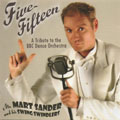 Like
me, Don Mather was surprised to discover how superbly this talented
young Estonian group recreates these 1930s pieces from the Henry
Hall archives - see review.
He’s right, of course, that this isn’t really a jazz album,
but it’s excellent for those who enjoy a trip down Memory Lane
- the sort of thing that BBC Radio 2 used regularly to do so
well, but now reserves for Friday evenings. The singers here
even reproduce the 1930s fruity BBC accent. Several of the pieces
are by Henry Hall himself, with Cole Porter, Vincent Youmans,
Johnny Mercer and Eric Coates among the better-known composers
of the others.
Like
me, Don Mather was surprised to discover how superbly this talented
young Estonian group recreates these 1930s pieces from the Henry
Hall archives - see review.
He’s right, of course, that this isn’t really a jazz album,
but it’s excellent for those who enjoy a trip down Memory Lane
- the sort of thing that BBC Radio 2 used regularly to do so
well, but now reserves for Friday evenings. The singers here
even reproduce the 1930s fruity BBC accent. Several of the pieces
are by Henry Hall himself, with Cole Porter, Vincent Youmans,
Johnny Mercer and Eric Coates among the better-known composers
of the others.
Eric Coates fans should make the 2-CD Classics for Pleasure
set of his music, with Sir Charles Groves and Sir Charles Mackerras
at the helm, their next port of call (3523562). Passionato offer
this in lossless flac as well as mp3 but at £19.99, more
than twice the usual price of the parent CDs. Amazon.co.uk have
the mp3 for £6.47.
Igor RAYKHELSON (b. 1961)
Little Symphony for Strings in g minor (2005) [18:27]; Reflections
for Violin, Viola and Strings (2003) [9:53] Adagio for Viola
and Strings (2002) [5:58]; Jazz Suite for Viola, Saxophone and
Orchestra (1989) [31:38]
Yuri Bashmet (viola, conductor); Elena Revich (violin); Igor
Butman (saxophone); Igor Raykhelson (piano); Yuro Golubev (double
bass); Eduard Zizak (drums); Moscow Soloists
rec. 12 January 2007 (Little Symphony); 7 July 2005 (Reflections,
Adagio); 20 June 2000 (Jazz Suite); Mosfilm Studios, Moscow.
DDD
TOCCATA CLASSICS TOCC0055 [66:58] - from Toccata
Classics (mp3)
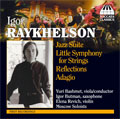 These
are all first recordings, so could well have featured as Discovery
of the Month, a reminder of the sterling work that the independent
labels, Toccata not least among them, are doing to make new
talent available. Carla Rees found the CD not 'hardcore' enough
to fall in love with - see review
- but thought it well worth exploring. I’m not a contemporary
music junkie, unless it be something of the order of Jonathan
Dove’s music - see last month’s Roundup here.
This is all very approachable, so I liked it more than CR, though
none of it is particularly memorable.
These
are all first recordings, so could well have featured as Discovery
of the Month, a reminder of the sterling work that the independent
labels, Toccata not least among them, are doing to make new
talent available. Carla Rees found the CD not 'hardcore' enough
to fall in love with - see review
- but thought it well worth exploring. I’m not a contemporary
music junkie, unless it be something of the order of Jonathan
Dove’s music - see last month’s Roundup here.
This is all very approachable, so I liked it more than CR, though
none of it is particularly memorable.
This recording is also available from other download sites,
but there are distinct advantages of joining the Toccata club,
including a reduced price of £5.99 for downloads.















